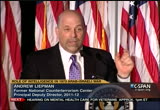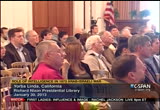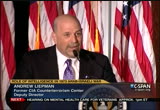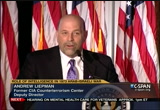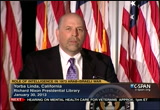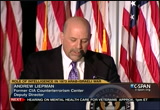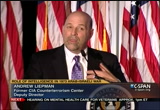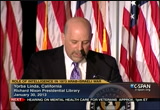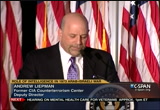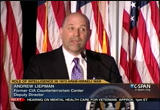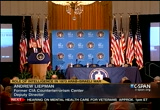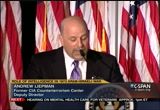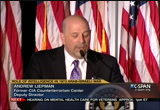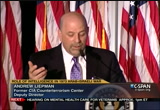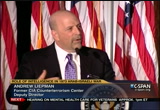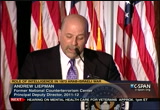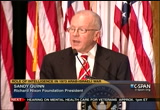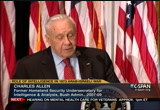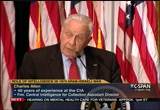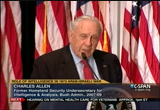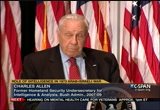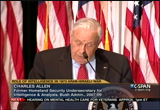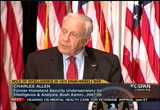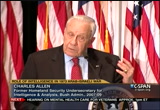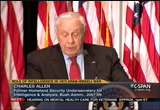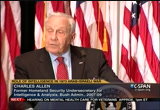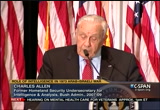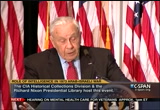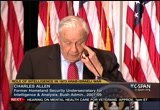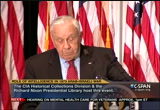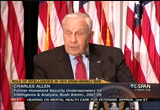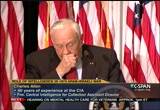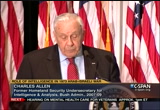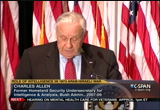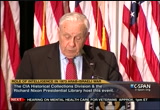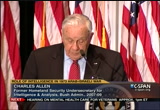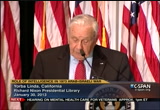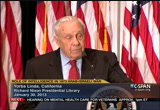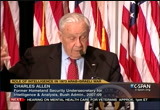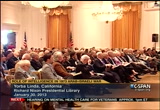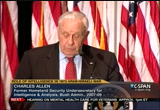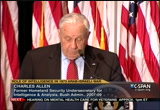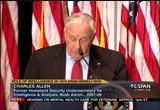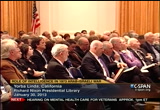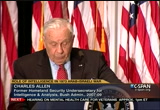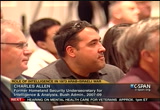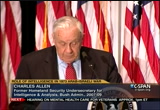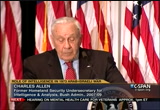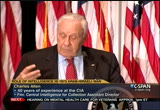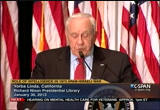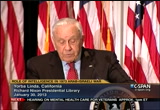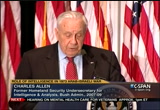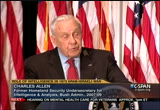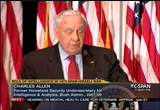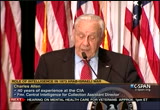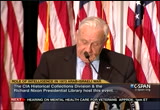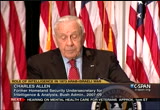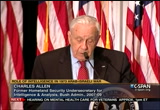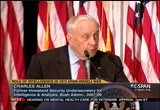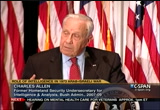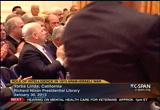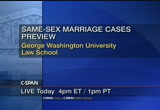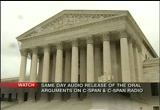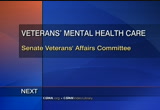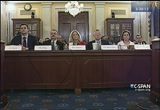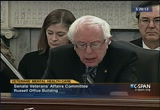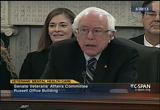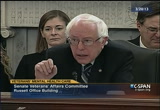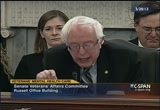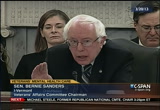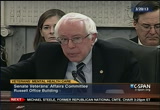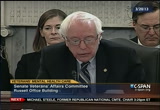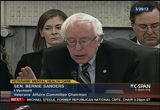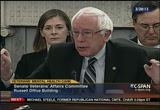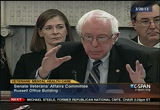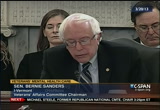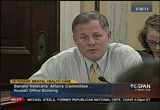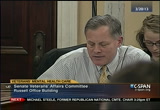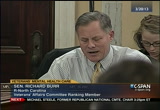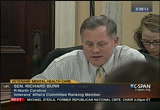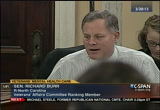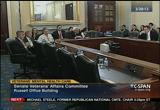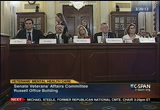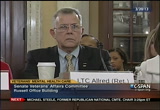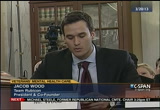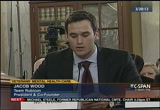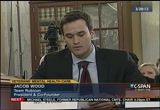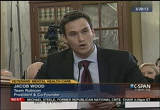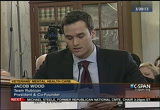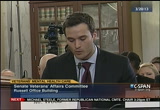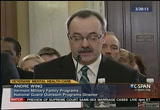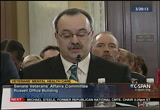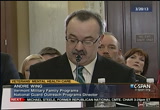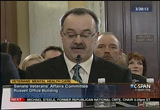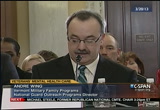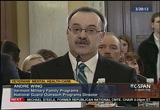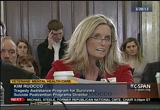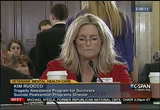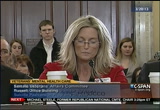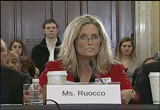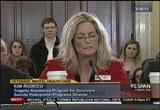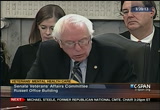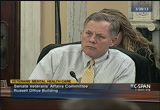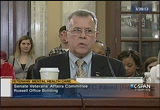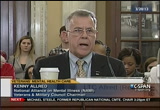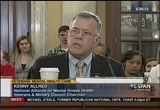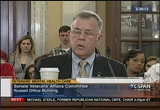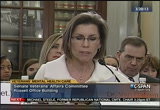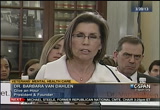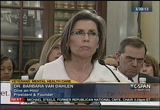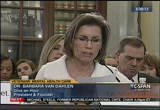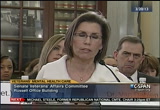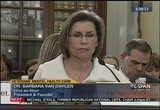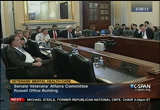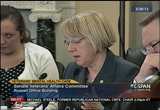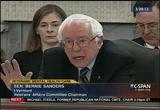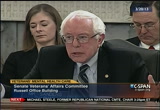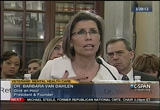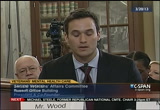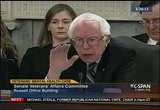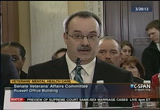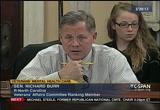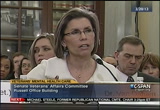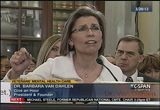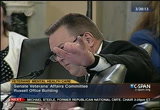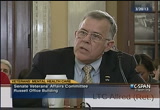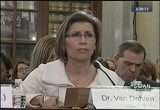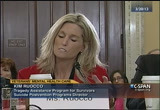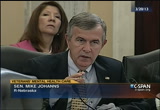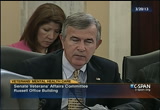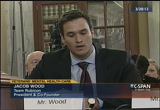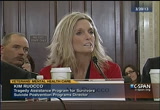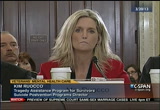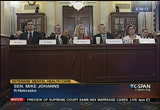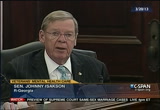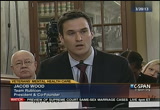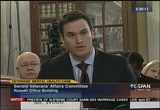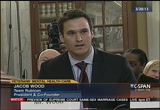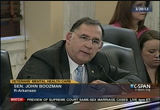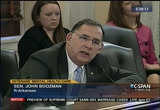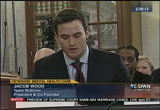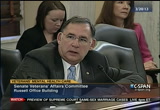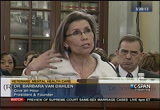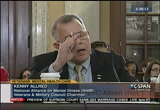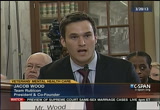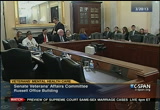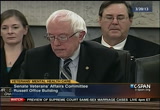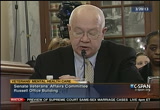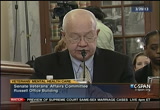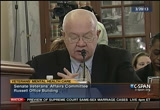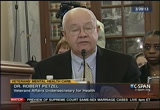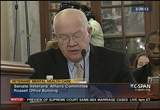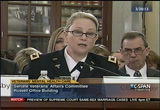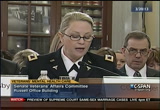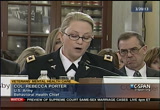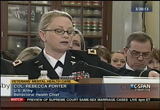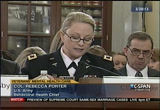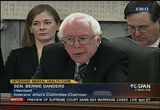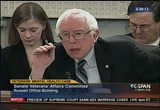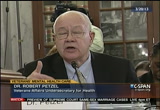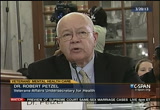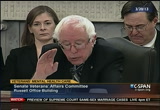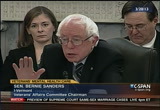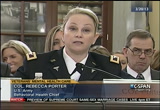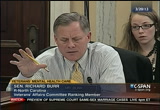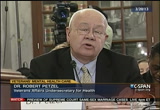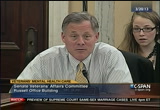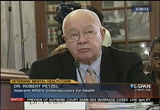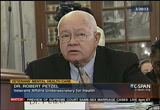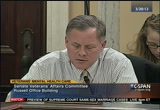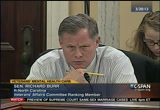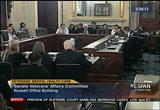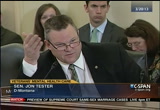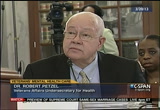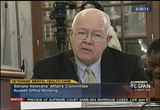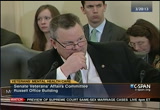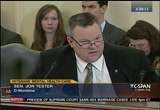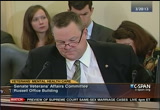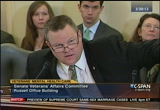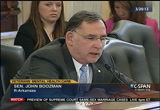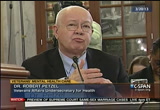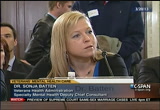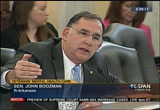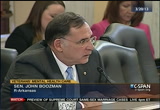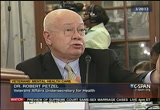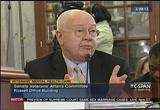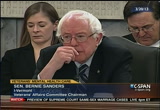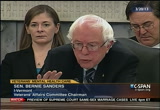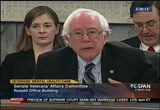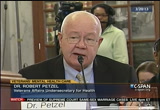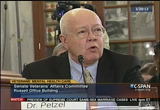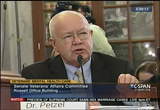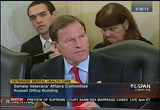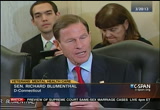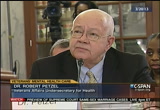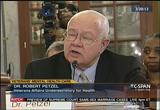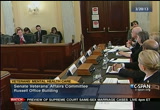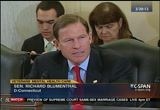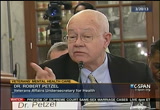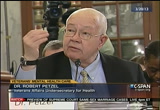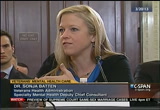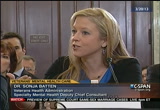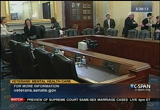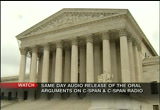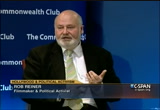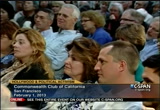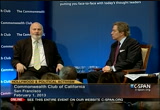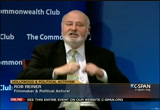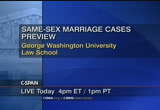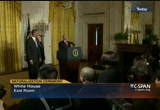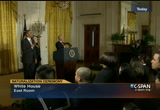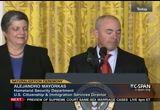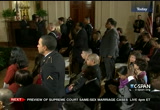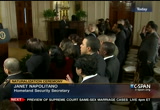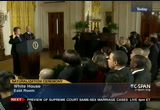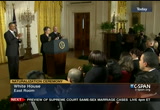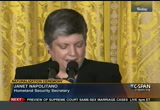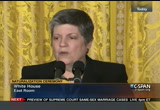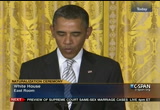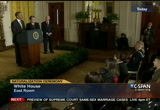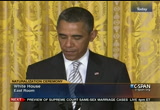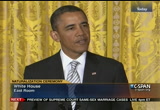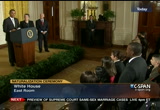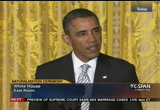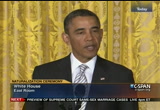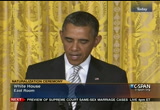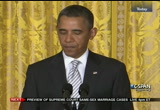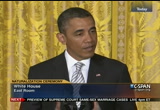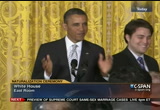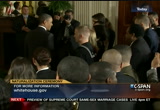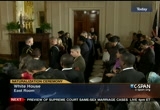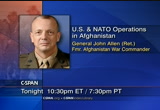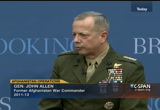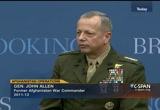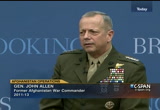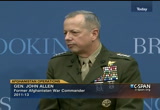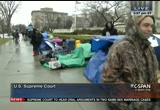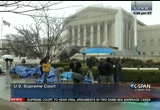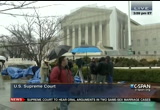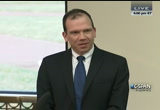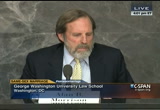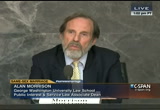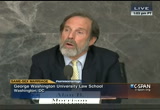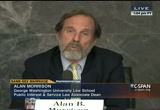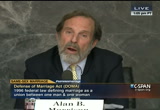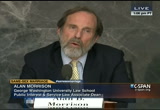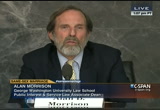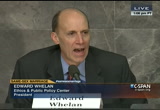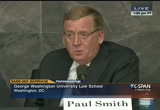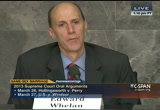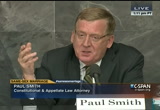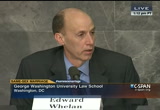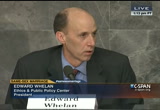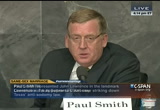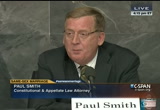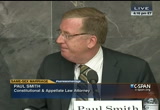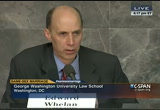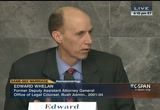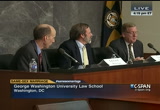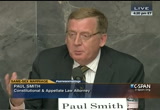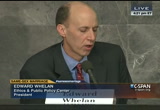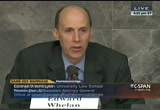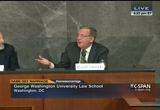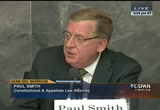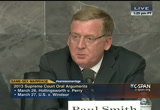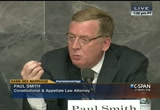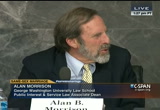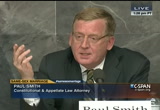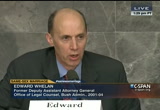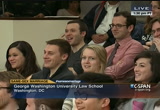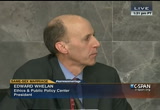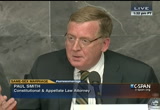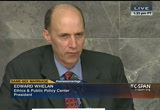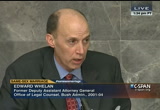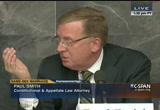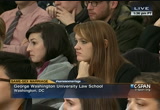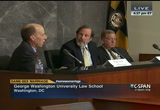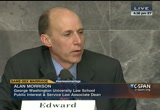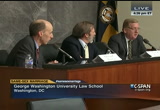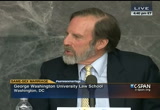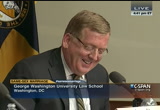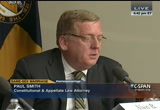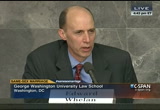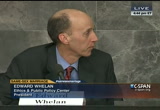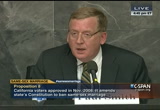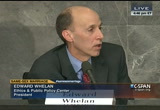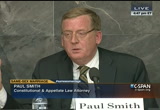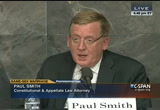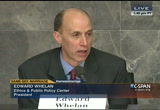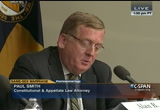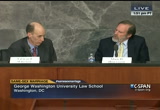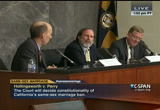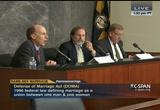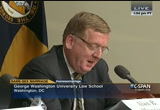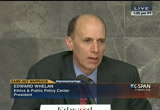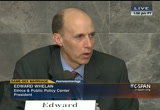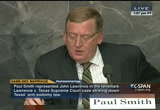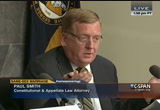tv Public Affairs CSPAN March 25, 2013 12:00pm-5:00pm EDT
12:00 pm
to try to force them to come to a final agreement. been written on this subject. dennis ross and many others have a more strategic view. i will tell it from my perspective of an intelligence officer tried to support this team. i suspect few intelligence officers and few diplomats at the time would have given this approach more than a very strong -- small chance of success. everyone knew it was a pretty high-risk scenario, but yet we've really struggled with always being the naysayers. was he would not be able to deliver his own delegation, much less his electorate. the palestinians were fatally split between generations and other issues, and our feeling was the older generation have more sway than the younger
12:01 pm
generation. it was entirely possible that incapables genetically of saying yes. most of these points of the end of the day proved right. they did not come as any orrprise to dennis or aaron the diplomatic team leading the debt -- delegation, but it was still a role that we consciously knew we could not be the people who constantly said know. so we asked ourselves, how does the team of experts find any utility in what intelligence has to say? to his credit, dennis ross' expert used to come and speak to us. he said do not take it personally that he really had anything great to tell them.
12:02 pm
needed backs to anchor the policy. they wanted the truth what he said was i realize my job is to imagine the art of the possible. our job was to remind him what was probable. i sank given that relationship, it needed to be close and continuing honest. i think it really was. .t was a challenging time he played a unique and i think unprecedented role as the director of central intelligence in negotiations. he played negotiator sometimes, honest broker. he played father figure. he played any number roles in between the palestinian and israeli delegations. of --ays wondered, even
12:03 pm
as i was driving george around on the campus, how could we avert the seemingly inevitable breakdown in talks while remaining conscience of the fact that intelligence had to be absolutely objective. it was never easy or straightforward, but i think we did maintain our distance. our challenge again was not being the people who'd just said that is not going to work or you cannot do it that way or this won't fly. we ended up trying to explain the backdrop of the lip -- the delegations and the dynamic within the delegations. thatund in each -- aniche think thet i
12:04 pm
people about sound pretty useful. we never said anything about this is a long shot at best. so very different examples. hindsightn iraq where really shows we did not perform up to our standards and the peace process where i think we did. a lot deal has been written on how to improve intelligence and improve upon the relationship page. -- . i think one of the basic factors is intelligence has to be good. you can define, debates over what good it means, but we have to do the best job we can at producing analysis. we have not always in the past. we have learned from our mistakes. specificom seven
12:05 pm
things i learned in my career. and i know i am an expert at these mistakes, because over the past three years i have made pretty much most of them. they overlap. if anyone is taking notes and at the end of the list you come up with six or eight, that is ok. i just picked seven. first lesson comes from my experience in iraq, never forget the focus on precision of language. make absolutely sure of audience knows what you mean. that you did not give the audience a choice of figuring out what you might mean. our language was not always precise. sometimes we make judgments that were not supported that well, too broad. you could have distinguish better between what a stockpile was and what the break up capacity was, the difference
12:06 pm
between intentions and capabilities. i look back and think that was a really important lesson that i think we've taken on board. the second lesson is we need to have the stomach to revisit our long-held conclusions, no matter how long we have been saying something, we need the strength of will to go back to say we have been saying this for a long time, is it still true? we might have asked ourselves, for example, sometime along the way after the inspections that resulted in so little, we might have questioned our assumption that saddam hussein would never give up his wmd. that was a deeply ingrained assumptions. we should have examined that more closely. third, never take sides. do not advocate a policy position. in short, there is a big difference between supporting a
12:07 pm
policy.aker and a fourth, avoid group thing. no matter how many people support it. there is a lesson where the panel reflect on this a bit. that affectedngs our judgment about whether or not there would be a war was what the israelis thought. they thought there will not be a war and probably to put too much weight on that. of the 1973 war, there was at least discussion, debate. in the case of iraq there was not enough of that. there was no real debate. what itot know exactly was or where it was but knew we
12:08 pm
had it. byfifth, do not get trapped your past judgments. what i mean is the longer we stick to nine, the more pieces of analysis, the more articles for the president congress and strategic analytic pieces we write that have the same bottom- line the set -- the harder it is to back off of that. harder because you become more and more convinced you are right and harder because how do you explain to the president of the united states or congress that we told you this for 10 years and have decided we are wrong? you have to do a pretty good job of explaining why you think we are wrong but we have to realize the number of times you make a judgment does not make it that much stronger. sometimes if we are surprised
12:09 pm
the next time we decide to invade israel, that probably would not happen but we would not be surprised again. assyrian cold start. much of that drew from the pain of having been wrong and 73. after 9/11 ashat well. charlie and i have talked at length about the steps we took after 9/11. some of them were taken because we desperately -- desperately wanted to prevent another 9/11 and another mistake. in that case most of those deaths resulted in the safety of the nation.
12:10 pm
your failurel of and think about the future. the sixth thing is an issue we struggle with. and we cannot let the focus on tactical day-to-day details prevent us from noticing change. strategic change is really hard to notice when you are in the midst of it. it is hard to detect, nearly impossible to do, unless you are constantly looking for it. ironically the people who are most ill-equipped to see change are the experts who follow the issues most closely. the people who you rely on to analyze an issue are exactly the wrong people to tell you when that issue is bearing off in a different direction. and the last thing i think is was toog that really frequent in our analysis, and that is we did not distinguish
12:11 pm
what we knew from what we did not know from what we thought. in fact, sometimes if we think something for long enough, then we think we know it. there is a big difference between what we think our conclusions are and the fact. just wrapped up, come back to the subject of my part of the seminar, which is the relationship between intelligence and policy makers. it is critical. it is why we exist. we need to be responsive and relevant and reliable and expert. looking back over my career, some of my best memories are engaging with the policy side of this, trying to figure out a complicated issue when the stakes were high and the situation blurry. often the satisfaction came from helping policy makers think through really tough problems like the peace process.
12:12 pm
sometimes it came from sharing in important successes like unraveling a terrorist plot or finding a key terrorist. knowing that from my analysis was giving the customer what mcconnell once aptly described as decision advantage. i really cannot step away from the issue without mentioning the constant challenge that we as intelligence professionals face in trying to find the right balance between being too close to our policy customer, so that we risk becoming attached to the policies and risking our objectivity. and yet on the other hand, keeping too distant and losing touch with what really matters, with what the policy maker really cares about, and yet retaining our perfect objectivity. i think we can easily balance
12:13 pm
between them. we do not need to choose. but we always need to be aware of the tension between them. am i can still -- i can still remember when i was a junior analyst, the hardest part of writing a paper, the last section really struggled with. the section was always called implications for the united states. you would think after spending weeks, sometimes months or years writing a paper that at the end of the process you would have a really good idea for why this was important, why this was of value, but often we struggle. we really did not know. 25-30 years ago i think our interaction with the policy community was more distant. listill sometimes -- and a
12:14 pm
sometimes still struggle with what is important to the united states. that is something we need to build into analysis and figure out before we write a paper, why is this important? we owe it to the nation to do our best to explain problems as clearly and objectively as we can, and zero ways to learn lessons from the past. as i said, some of my most frustrating days was spent trying to get the message across, and sometimes i never did. my fondest memories come from analysis figured is a really important decision. middle east diplomacy, protecting the country from terrorism. so thank you from the cia for making the documents available. the key to the nixon library for hosting this incredibly important event. i think you have a treatment -- a treat in store for you. i am looking forward to
12:15 pm
listening to the amazing spectrum of expertise that the panelist and next speaker was share. thank you. -- will share. [applause] >> thank you, andy. aren't second keynote speaker has spent 40 years in the cia, charlie allen. he was assistant director of central intelligence for collections. the deputy chief for intelligence of the cia county -- counter-terrorism center. 2007 he moved to the department of homeland security, and he served as under secretary for intelligence and analysis. he is the cia chief of intelligence -- was chief of intelligence from 2005-2007.
12:16 pm
--developed the homelands homeland security intelligence architecture. he is now president of the chertoff group. please welcome charlie allen. [applause] >> and thank you very much. it is a great pleasure to be here. discovered -- gave a great speech and hard to follow that wisdom. about my personal recollections of 1973 war. i think it will be very interesting. i do want to thank the cia historical collection division
12:17 pm
for classifying of documents, commentwhich i hope to at one time. i am also honored to be here with many of my friends for people i work with many years ago. i could talk about all of them and name all of them, but i want to say i am especially honored to be part of a symposium that features dick covar, who taught me a lot about critical thinking, writing, and intelligence analysis. this is very much a personal account for what to some seems to be a very distant history. accurately with relevance what occurred back in 1973 is very hard. if there are any inaccuracies, i know that he will certainly
12:18 pm
correct them. let me explain my role at the time. the cia in 1950 time -- 1958. i advanced to the elite of this occur intelligence by 1971. spent a year at the war college. came back, worked on the president's daily brief for over a year. at that stage we transitioned from jim sasser to bill colby. bill colby and abetted by having a newspaper formed for the president's daily brief, which people forget. i did not protect really like that format. i was very perplexed by trying to formulate the headlines. i found the hardest thing was to capture the essence of the intelligence brief, because you only have a certain number of spaces in order to do a final -- title if it is a newspaper. kolbe was very proud of it and really did like it.
12:19 pm
working for the president's daily brief is invigorating. you learn about the most sensitive intelligence activities of the community and cia. and exposed me to writing and critical thinking skills. early 1973 i was asked by lehman her brand office of central intelligence and was for -- by dick lehman brand office of central intelligence to become military of current intelligence. at that time bruce said he was under pressure from office of weapons intelligence, also from known as the mortons -- borne missiles and balance in center to get more technical
12:20 pm
intelligence into cia correct publications and improve the quality overall in writing for current intelligence of military analysis. i found this a very challenging assignment, and i thought current military production and what was called the regional analysis division of office of strategic research to be a great job. we worked on soviet union, china, eastern europe and south asia. hman clark and dick le were pleased with the results. evan hyman, head of the four missiles space activity center and later director of science and technology at the cia was pleased because to get more technical analysis.
12:21 pm
he is turning my great technical assistance into english. i raised remember him calling me in and saying you will is remembered as the guy that writes peter rabbit -- peter rabbit english. the difficulty of assessing egyptian intentions, office of cyanide 1973. you must remember the conduct military exercises in may and august causing military mobilization twice at great cost to tele-tv. i recall working with the head of the middle east and south asian branch at office of strategic research to ensure we have a right kind of collection. technical, human. so we have the requirements out. welle understood pretty the so but rigid soviet military shipments. we did not always know the content. content of what was in the
12:22 pm
shipments, but we knew they were very sizable back in those years. of egyptiannding and syrian forces in those locations was only fair. our son did -- our own understanding of the military intentions were very poor. real- time we lack near time space imagery capability, something we take for granted today and depended on capsules that were returned from space periodically captured by an aircraft over hawaii. then we raced the phone to eastman kodak where we had a tiger team ready to read out the results. so our technical collection in the form of imagery in force dispositions of each of them was surprisingly not that good. analysisther technical
12:23 pm
that was good but did not give us the brunt of trying to understand either arab state. i recall in late september egyptian forces were along the and begannow -- canal exercises. we detective exercise activity along that is really/syrian cease-fire line. we did have a human source reporting the syrians were planning a mass of muscle involving at least for syrian forcesns of the syrian reportedly would be in place by the end of september by the attack. requested u.s. technical collection for additional clarifying information. and reporting from damascus was good, not great. i cannot recall any good
12:24 pm
reporting from cairo. late september we were further alarmed when moscow began withdrawing dependents, and late september from the soviet embassy in cairo. greatre was ever a warning indicator, it is when this occurred. in retrospect it is hard to fathom why we and i did not issue strategic warning of possible war in the middle east. the soviets' new things we did not know. we also did not know there were using civil transport to move equipment and troops towards the suez canal. civil society,ct this was it. in retrospect, pretty clear. this could prompt
12:25 pm
henry kissinger to get involved. further, he sent a cable to the region urgently requesting assessments of the possibility that war could break out in the middle east. thecall distinctly reading reporting of those questions that were sent to the field. the chief submission, the chiefs of station agreed tensions were high and develop all -- the elements were making them an easy, but they did not foresee any immediate likelihood of hostilities erupted in the middle east. the israeli intelligence services was unanimous. neither egypt nor syria individually or combined were prepared to attack israel. the universe with which they responded the way in which the responders was sort of palpable. despite the worries in washington, the vigor with which the intelligence service responded had a tremendous effect on effectiveness. i cannot overstate that.
12:26 pm
it is now fascinating to read the declassified assessment that e sent to- ray klines dr. kissinger in september. he stated there were reports that syria is preparing to attack israel but conclusive evidence is lacking. then he states further, and our view the political climate in the arab state argues against a major military move against israel at this time. that was about six-seven days before war broke out. duties and office of strategic research was to work with the watch committee of the united states intelligence board. the committee was established by walter beetle smith in 1953 to provide warning of any surprise
12:27 pm
attack against the united states and its allies. the united states intelligence board watch committee was composed of senior intelligence officers. representing the major intelligence agencies. during on-crisis times and daily during crises. what committee report. and the head of the stuff that supported the what committee was the national indications center. about 25 officers. the head was a cia officer known as baxter swan. very experienced cia officer that worked in operations and analysis. i remember that he came to me and other officers on october 1, 1973 to coordinate the watch committee report for october 5.
12:28 pm
on for october we concurred in the following language. quote -- we remain at that immediate outbreak remains unlikely, although the risk of localize fighting has increased slightly as a result of the buildup of syrian forces in the vicinity of gold and heights. egyptian exercise activity under ways since late september may contribute to the possibility of incidents. september 5, a friday, 1973, i spent a good deal of the day working with analysts' an office of current intelligence and office of strategic research on a central intelligence bulletin on which it up president's daily brief was written.
12:29 pm
activity the state of in egypt, including dillard of egyptian air defense and arab forces, as well as the ground -- including the ground forces of egyptian military and arab forces as well as the ground war threatening. a bulletin that will remain in my mind forever stated as follows. the exercise and activities under way in egypt may be on a somewhat larger scale and more realistic than previous exercises. bey did not appear to preparations for a military offensive against israel. i remember distinctly putting to bed this current intelligence bulletin friday evening. stopping by the operation center to see any new intelligence had arrived. i was told that fatah had gone
12:30 pm
on a war footing. this worried me a bit. i thought about calling an analyst to take a look at this and other material that seem to be flowing in increased volume into the office center. it was friday and had been a long week, so i went home. my home telephone rang on a october 6. my wife passed the phone to me. on the other end of the connection was john paisley. work.d come to report to lehman. declaim and will chair at 0900. he further stated the combined armies of egypt and syria would attack israel in four hours and there was nothing the israelis could do to stop the attack
12:31 pm
because it takes tel aviv defense force is 72 hours to mobilize. my on the question was, are you certain? he said henry kissinger was called to inform -- w. to langley to confirm. then i turned leghman it was in the car waiting. then we went to the pentagon there were a lot of notable military and intelligence officers, help the number of action officers racing back and forth. reports were flowing egyptian forces were poised -- or were crossing the canal. the intelligence for increase. intelligence reports
12:32 pm
increased. we have reports of dogfights between israeli and syrian aircraft. saidhis point dick leghman leman, we can do no good here and i suggest we return where we might be able to do good. that was a very interesting and paralyzing event. when we returned to langley, all of the senior officers were present. of middlem director east and african division took the lead on what the agency should do next. it was a distinguished and decisive individual armed with a doctorate on colonial african history. he told him plans were underway to establish the cia task force and wanted dick covar to head
12:33 pm
the task force. he was one of the agency's most distinguished intelligence analyst and extraordinarily gifted writer. and he was generally about pierre and production management, having served in a whole series of senior analytic capacities. bruce clark stated he wanted me to be the task force military deputy responsible for military analysis. the cia task force took form reject a cold in a hurry. we used a large conference room and adjoining offices. there was space for us to operate. would turn out a situation report every four hours until the conflict came to closure. the director of operations, adjacent to the task force, also was easy to reach to ask for the
12:34 pm
latest from our clandestine and collectors abroad. busy.ecame incredibly he was in charge of integrating the overall situation reports and other intelligence assessments for policy officials downtown. so thatdinated with dia we would not be out of kilter with analysts' that did military intelligence across the river, down the river. turned out, many of which had been declassified, served as a basis for the , and int's daily brief do not intend to go through the next three weeks of situation report by situation report. you can read the declassified documents and draw your own conclusions as to the adequacy. what was painfully obvious at the time, and today
12:35 pm
retrospectively with the limitations in collections and analysis, but more importantly the over depended on israeli intelligence during the buildup to hostilities and the date that immediately followed the opening combat. of the six-days war in 1967 tended to significantly affect judgments in the early days of the war. the view within the intelligence community generally was all those surprise, the israeli idea would soon reversed any gains made by the israeli army. the special action group are instructive in this regard. in the briefing they acknowledged the egyptians had made some progress over the can now, but later in the response from secretary kissinger on haul logs it will take israel to push
12:36 pm
them out, he stated a couple of days. he was equally confident and stated the israelis appear to of contained the syrian forces. made the comments even while the watch committee in the pentagon was trying to wrap up what was really going on and was having difficulty concluding a major war was under way. that is true. i think he was a very smart man and going with his gut and comments at that stage were not informed, even by the most current reporting but by the view that the arab armies, even though they attack in a surprise attack, that they could not achieve the kind of goals that the president of egypt had set forth.
12:37 pm
the declassified and of its of the seventh of october -- notes he seventh of octoberob were better. pre infantry and armored division. then he says they are doing better than they did in 1967. responding to a question from kenneth rush on why the israelis were so cramped, he said because they have a real problem on the heights. he also noticed israelis were taking substantial casualties and israel may fear break through. colby began the meeting by stating israelis had destroyed most of the bridges, the pontoon bridges by the egyptians. they destroyed a. later in the meeting the
12:38 pm
secretary of defense asked about the accuracy of information on the bridges. of that is of the israeli store. the secretary of defense made a very brilliant comment in the classified document. states we're completely dependent on this release for the information. exactly-- that is not true, but a bit overwrought at that stage. a president daily brief reflected heavily what the israelis told us. for example, the number of floating bridges and whether there were operational was a burning question. thebridges were inside missile systems and below.
12:39 pm
it made the reconnaissance buddies difficult without losing a lot of aircraft. began tortainly understand how dependent we were on the israelis, and we had to recalibrate in many ways. we did that. for ae equally dependent number of troops that had crossed the canal. our early analysis was not exactly accurate. the egyptians, in fact, had succeeded in getting far more men and heavy equipment across the canal than ever anticipated by u.s. intelligence. of october the 10th river more accurate. 30-40,000 egyptian troops were across the canal. in addition, we are unable to report with any certitude in the analysis on what was occurring
12:40 pm
and golan heights. clear.me so syrian forces held the town for several days, resisting a number of counterattacks. in my view the analysis improved and that the unrest after the shaking beginning. it became more detailed and accuracy increase to such an extent members were alarmed by 10/11 october on whether israelis were suffering equipment shortages. to conduct ait mass of attack with success. we are beginning to understand the military situation and increasing difficulties of the israeli forces.
12:41 pm
although we excess with confidence the israelis would prevail on both fronts, we knew they were incurring substantial casualties and they would require the united states to immediately.supply one of the bright spots was the understanding of soviet military resupply efforts. although we were not always knowledgeable about what was in the shipments by sea or air, we certainly knew with great specificity the number of flights in ships, and did have information on cargo and content. we were also aware at the time that soviet troops in egypt were there who were associated with the arab missile system. a lot more to say about that later. when henry kissinger stated that the airlift should exceed that of the soviets by 25%, i think the military knew just how to
12:42 pm
execute that directive. our collection of intelligence from technical and human sources improve significantly. our military assessments were very deep and detailed. thewe were so frustrated by lack of imagery of the battlefields. satellite states had in orbit. was not scheduled to be returned to earth until the end of october. not very helpful to us at the time. so we could not get an accurate order of battle. importantly, we cannot assess with confidence the damage incurred by the forces fighting in egypt or on the golan heights.
12:43 pm
reflected in washington. -- this frustration was reflected in washington. u.s. intelligence urged we have a black bird mission over egypt down the suez canal and up over the golan heights. as i recall, the mission was flown on the 13th of october. and the plane had to fall -- live from south carolina and return. a number of refueling. a long, difficult flight. we sent a tiger team to eastman kodak to do an immediate assessment. coldly was able to get our preliminary assessment from the mission that was very successful. along the canal there were 440 israeli tanks with the two- story, 835 egyptian tanks was 16 destroyed. 419g the golan heights
12:44 pm
israeli tanks with 36 destroyed. 339 syrian tanks was seven destroyer. henry kissinger said there must be more than seven destroyed. when he said i agree, kissinger stated, and the showed even in the great crisis, even with the tremendous group that was theed, and you're off by decision making and brilliance of people around the table. kissinger says i like precise intelligence somewhere between 7-800. a quote directly from the minutes. i think it is a tremendous ". needless to say the flight was extraordinarily useful.
12:45 pm
we saw and knew that is really armor plan to attack across the canal. the imagery showed the scene. within a day or to the israelis have not only crossed the canal, but with heavy armor are moving to cut off the egyptian third army. technical intelligence we were able to track the is really moments with some precision. it was that point i was directed by bruce clark or i cannot remember who to go with the cia office to brief senator scoop jackson. support for the state of israel was extremely strong. remember we met senator jackson in his office. we quickly told him of the successes across the canal. we have imagery demonstrating
12:46 pm
this. i remember senator jackson responding enthusiastically. by the time we left an hour later he was almost giddy with the light over the is really advances. very interesting for an officer of juppe elite trying to assess the intelligence. -- very objectively try to assess the intelligence. as the israelis crutcher we gathered the upper hand and we continued around the clock situation reports contributing to the current intelligence borders -- bulletin's in daily breeze. other duties included meetings with agency officials. was easy to breed. amazingly and formal and always grateful. all of these tense days as the fighting grew, climax, and then
12:47 pm
began to die down, but as the possibility of confrontation with the soviet union grew, i never heard him once raise his voice or show irritation to the officer supporting him. he was always the lowest key person in the room. once i remember walking with him to the elevator as he is headed downtown for a meeting. i was briefing him on classified late-breaking developments, which i had only written down in handwritten form. he listened carefully, but then asked for my hand-written notes. he is stepping them into his pockets as he disappeared and the elevator door closed and went on his way to the white house. that just showed the measure of colby and his ability to be very calm, cool under difficult circumstances. have the opportunity at
12:48 pm
that time to frequently brief ambassador -- at the time lieutenant general in uniform. walters. he would arrive 06 hundred every morning. he would comment briefly -- frequently about the analysis .ring i some classified documents referred to the other arab forces. he was familiar with many of the military's. he a tremendous insight. he had worked with the moroccan military in world war ii and have respect for their courage and tenacity in fighting against german forces. general walters was highly skeptical that two divisions promised by saddam hussein would never reached the syrian front. and he was right. as far as i can recall, are iraqi forces never arrived in
12:49 pm
syria until well after there was a cease-fire. it was not that far to move their forces. october 20 the united states and soviet union were working to broker a ceasefire. and the cease-fire, which went into effect on october 22, unraveled quickly as the israelis continue to attack and cut off the third army in the city of suez. the crisis deepened as the soviets indicated they would not stand by if the israelis continue to annihilate the third army. i will leave it to others to discuss this particular phase of the war. i do know it was operated as an extraordinary high-level professionalism and always under the confidently -- leadership of dr. kissinger. in retrospect the delicate decision making is orchestrated as the declassified minutes show was absolutely exquisite.
12:50 pm
with the passage of years, it is interesting how little the world seems to recall there was a risk a confrontation between the united states and soviet union in october, 1973. neither i nor any of the military on a note -- analysts have confidence that the 22 october cease-fire would hold. we broke up. what we did note is the soviet air bridge had been very heavy in concerns have risen accordingly. i do recall discussing repeatedly the potential insurgents into damascus. we are obtaining ambiguous information that soviet paratroopers were about to blow them on to transport aircraft. i remember we had flights going to cairo and damascus on the 25. as usual we did not know with
12:51 pm
great certainty. mentor ber dr. parr mento pressing me on this subject. of course we did not have the real-time imagery that would show paratroopers uploading on to transgendered -- transport aircraft. we just did not have it. what did happen was that president nixon directed on the 25th of october to bring u.s. military forces to assume an increased alert. this was known as defense condition 3. we knew all the airborne divisions were on alert and the potential for moscow to insert forces into the middle east was rising. but we did not have national technical means at that time sufficient to support our crisis management. there was of very vital to the classified report. entitleda memorandum
12:52 pm
soviet nuclear weapons in egypt. that brought into sharp focus the question of how far the soviets were prepared to go to protect vital interest in the middle east, especially with egypt. officialll, a senior in the office of strategic research raise the issue of a popular introduction of soviet nuclear weapons into each of fairly early on in the conflict. tactical nuclear weapons -- scud missiles as a conventional warhead or nuclear weapon. probably dr. airmore theed to atuhouthor memorandum. we had some difficulty getting
12:53 pm
people to believe moscow would introduced a clear weapons. but it was there. this certainly strengthen the need for and urgency for a permanent cease-fire. that cease-fire was reached on the 20th of october with great work between the soviets and dr. kissinger and soviet -- and president nixon. with the prospect of immediate soviet interaction beginning to recede, the principal task was to monitor the ceasefire to ensure it was holding, with which minor exception was the case. by the time we reached situation report no. 93, ca matters, the deputy director of intelligence was more than prepared to dismantle the cia task force, with the revised it could be quickly reestablished if events warranted. i do recall as the war wound
12:54 pm
down that dr. proctor showed up late evening for briefing on the status of a conflict about 31 october. i was editing one of the last military contributions to our .ep dr dr. parker with the me and saw i was exhausted in the city sleep and i will edit and report, and the only doctor proctor would have done something like that. as i look back at those intense days over 40 years ago i remember the shock that rippled through the cia at langley and the dismay we had within the military in a list and cia, as well as the rest of the intelligence community over the collective failure to provide any warning to the policy level. in the years that followed i felt a personal responsibility for contributing to the failure to warn.
12:55 pm
one way the failure did serve as a catalyst for reaching reconsideration of the community national warning strike to become the impetus for reform cannot from the intelligence community but from a house permanent select committee on intelligence, which reviewed -- which was produced in 1978. it recommended they should establish a single focus for warning. it led to the establishment of the national intelligence officer for warning position and the establishment of the national warning staff, which would be very objective and independent but supports the national intelligence officer. later i had honor for serving for four years in that position. failurect. 73 war, the -- and the talk a little bit about that. seemed to epitomize failures we had had in the past and failures we have had subsequently.
12:56 pm
understand abrupt discontinuity. regional -- regional analyst thinking things will continue. as bob gates said at the national foreign intelligence abruptn 1976 -- 1988, discontinuity is sometimes the last individual to recognize that is the regional analyst. he or she tends to think things will continue. we initially were overly depend on our allies. understanding to what was going on. we minimize also, which was very unfortunate, the military capabilities and objectives and objectives of egypt and syria. we played down the significance of military indicators that
12:57 pm
egypt and syria were intent on war and willing to pay an extremely high price in blood and treasure. we listened to the mistake and opinion of foreign leaders. we did that in 1990 when the saddam hussein invaded kuwait. we all should read the outstanding review of the intelligence community post- mortem program. 1973-1975. it has been declassified. very instructive. should be required reading for young officers entering intelligence. the lessons unfortunately are hard to learn. we are much better intelligence community that we have ever been. we have more intelligence. we understand it better. our analysis is better. our collection is far better in massive ways.
12:58 pm
my greatestame time concern to the intelligence community today involves the more current reporting more and more -- or immediate reporting been looking strategically. during the long-term assessment and being reported for the long- term assessment and being able to provide warnings when required. forn i became the nio warning i have been personally former deputy director of the intelligence of the cia, by the 1973 failed. threatened to invade kuwait. we thought and we saw a mobilization of his rocky ridge of iraqi forces. we thought there were very genuine preparations for war. causing thisere location of the civil economy
12:59 pm
and in order to move forces rapidly to southern iraq on the border with kuwait. warning staff issued a of war. around the 24th of july we issued a warning of attack on the first of august. at that time, we still have problems competing with the broader, larger community agencies, which accepted more reassuring messages, and which went to our senior policymakers. we are in the 21st century. leopold new -- we have whole new challenges on how the expectations of intelligence and vital necessity in the information age. we a policy makers coming in who come from a different prism because they're used to using wikipedia or can look at anything they want.
1:00 pm
for us to remain relevant and possibly have to not only learn from the lessons of the past, but we have to deal and except a lot of the seven lessons that andy stated in his the seven les stated in the earlier address. again, it is a great honor to be here, to speak here, to think back 40 years. and to think about what we did right, what we did wrong, we were blessed by a great leadership at the white house in this great crisis. and we got through it. it really did lead to the peace accords of the late 1970's at camp david. so, thank you again. thank you very much. [applause] >> thanks to both mr. liebman
1:01 pm
and alan for those intriguing and revealing insights into an important moment in history. we are going to take a brief break. we will be back here at the clock for two fascinating panel discussions. i hope he will return. those of you who would like refreshments can do so in the museum cafe. we will see you back here at 3:00 in the east room. thank you. [captioning performed by national captioning institute] [captions copyright national cable satellite corp. 2013] >> we will continue with live coverage here on c-span. we will preview the same-sex marriage cases coming before the supreme court this week. two legal experts would examine each case. that will be live here on c-span beginning at 4:00 p.m. eastern, as i said. yah hoo news is reporting that -- chief justice' cousin,
1:02 pm
lesbian cousin will be in the court room. she said she hopes her first cousin will decide to overturn the california gay marriage ban so that she can marry her longtime girlfriend. the case dealing with the marriage ban comes before the court tomorrow. the court will decide the constitutionality of the proposition 8 ballot initiative amending the state constitution to recognize marriage as between only man and woman in the state. the second on wednesday examines the defense of marriage act, defining marriage as between one man and one woman. the court is releasing same day audio of each of these cases when they are over and we will have coverage beginning at 1:00 p.m. eastern on tuesday. the oral argument will be air each of those arguments -- the oral argument will be aired again.
1:03 pm
ladies,"t, on "first called bigamist and adulterer during her husband's presidential campaign, rachel jackson dies of an apparent heart attack before andrew jackson takes office. his niece takes her place as hostess, but is dismissed after fallout from a scandal. in the next administration, angelico van buren is the hostess for her father-in-law, martin van buren, who is a wood door. -- widower. tonight, on c-span. >> last week the senate veterans affairs committee held a hearing on veterans mental health care and the need for assuring timely access to care. the hearing heard testimony from two panels, including mental health specialists and military
1:04 pm
veterans advocates. according to the veterans affairs committee chair, veterans are committing suicide at a rate of more than 8003 year and he urged the affairs department to increase the hiring rate for mental health clinicians. [gavel] of thethis hearing saturn -- senate veterans' affairs committee is beginning. i want to start by thanking our wonderful panelists for their years of experience in the important areas they are discussing with us today. i want to thank the va for being here as well.
1:05 pm
know, it isk we all 10 years with the united states went to war in iraq, went to war in afghanistan before that. what we have learned in a variety of ways is that the cost of those wars has been very, very high. not just in the tragic loss of life that we have experienced, not just in terms of those who have come home without arms, legs, eyesight, or with hearing problems, but also in terms of what we call the invisible wounds of war, which are quite as real as any other wound. those wounds include posttraumatic stress disorder, , a dramatic day -- shredded brain injury, and -- traumatic brain injury, and
1:06 pm
further -- tragically -- it includes the serious problem of suicide. we are losing about 22 veterans every day as a result of suicide, that is more than 8000 veterans every year. while suicide is a major, major problem in the united states as a whole for the civilian population, it is a terrible tragedy for the veterans community and is something that we must address. let me preface my remarks by saying that i think everyone understands the issues we are dealing with today are very tough issues. if anyone had a magic solution to the problems of mental illness in general, trust me we would have heard about them a long time ago. so, this is a tough issue and we are going to do our best today to figure out for we are in terms of the needs of our veterans going forward. i think that everyone is in agreement that insuring timely
1:07 pm
access to high-quality mental health care is critical not only for our veterans, but their loved ones as well. what we are going to hear today from the panel is that mental health issues impact not only the soldier and veteran, the impact wife, the children as well. our goal must be to ensure that veterans get the best mental health care possible and that they get it in a timely, non- bureaucratic way. how it is delivered is of enormous consequence. i want to commend the va for their work in this area. the department has made important strides forward in providing mental health to our veterans. in fact in many ways the va is leading the nation in terms of pst research, but clearly with
1:08 pm
all of the accomplishments, much, much more must be done, because we are entering into an area that is impacting tens and tens of thousands of veterans and we must find a solution where we can. we know that our veterans who need mental health care services need them quickly. today all first-time patients referred to are requesting mental health care services and are required to receive an initial evaluation within 24 hours at a comfort -- and a comprehensive evaluation within 14 days. in april of last year the office of the inspector general found that vha was not meeting the benchmarks. some veterans were waiting as many as 60 days for an evaluation. in the real world someone is struggling, someone is hurting internally. if someone is drinking too much,
1:09 pm
doing drugs, clearly waiting 60 days is not acceptable. that is in fact a deeply troubling find. one year after these negative findings it appears that the va has made progress in implementing recommendations from the report. now, asways people are i understand it, getting their evaluations within 24 hours, but that is an issue we are going to explore this morning with the va. but the point here this morning is that if people are hurting, we need to get them in the door and get them into the system. that i remain very concerned about, both in the va and as a member of the health education committee, this is not just a veterans issue, it is an issue for the entire nation, but
1:10 pm
we have in terms of mental health providers. these long wait times that i mentioned are partially caused by staffing shortages. i am pleased that secretaries hassecchi -- shinsechi applied to hire more mental health conditions. as of the 13th they fired more than3000, including more 1100 of these new mental health clinicians. this is good progress towards reaching their goal. emphasize this point, i am very concerned that va has hired only 37 clinicians in the last two months. i understand the challenges. i think we all understand the challenges. you do not walk down the street and get the first person. you want to make sure the person you are hiring is well-trained and of the quality that the
1:11 pm
veterans deserve, but clearly the va must step up hiring if they intend to meet their goal of 16 new clinicians by june of this year. they will be attempting to meet over 500 in the next few months and i do not see how that is possible. we do want to talk to the va about how they are moving forward in this area. it is making sure the people are of good quality, but we have got get people into the system as rapidly as we can. in terms of quality is clear that we want our veterans to be mental properly trained health counselors who can provide high quality of care that veterans deserve. the va has made important steps forward in this area. clinicians are now trained in evidence based therapies, like
1:12 pm
cognitive behavior and prolonged exposure therapy. while the a clinicians are trained in these therapies, we must do a better job of tracking utilization to make sure that what these clinicians are trained to do is being put into practice across the country. timely, high-quality care only matters if the care is delivered to veterans in inappropriate way. the va must continue to provide care in a variety of settings. medical centers, community based telehealth service is, they each claim court rules. va medical centers are equipped to treat the most severe cases, such as p t s d. they are also critical of the health care patients admitted for physical injuries. that said, and i am a great
1:13 pm
supporter of that -- i am not sure that we utilize them as much as we should. that centers provide a safe and welcoming homelike environment for veterans receiving home care, counseling, and group settings. veterans often feel very comfortable in that non-root -- non-bureaucratic environment. the mental health services closer to their homes, in certain situations they use madison to link to clinicians in medical centers. the va has done an excellent job in terms of telehealth in general. it is critical that they provide these options for care, making sure they remain available and the veterans know about them. i believe the next hearing that we will have deals without patients in general. you could have the best care in the world, but of the veteran does not know about it, it does
1:14 pm
no good at all. significant strides forward have been approved. we must do more to insure better prevention for today's service members tomorrow. the army, and i think we are all levelof the frightening of suicides within members of the armed services today. practically one per day. they have got to help us address this issue. based on the efforts of this committee, the behavioral health committee recently finished a review on behavioral health care, the report provided multiple recommendations for mental health counseling. in other words we are beginning to also understand that a soldier is a soldier from the first day in the military until his last day on earth, when he is in the va. that continuity of care has got to be extremely important.
1:15 pm
while we often think of the military and the va as providers of mental health care for our service members and veterans, community organizations like the ones that will testify here today play a key role in helping veterans access the care that they need. these organizations can partner with the a to identify veterans in need of care and provide direct care to veterans. we are going to hear from these wonderful organizations. i think you also much for the work did you do and for being with us today. i will introduce you in a few minutes when you testified. these organizations do not shy away from the worst consequences of serious mental illness, including suicide. in my home state of vermont the veterans outreach program upgraded the need to prevent suicides from occurring. that is true of all the organizations here today.
1:16 pm
so, let me just conclude by saying that the issue that we are dealing with here today is a very difficult one. it is an issue of enormous consequence, an issue that impacts the lives of tens of thousands of men and women who put their lives on the line to defend this country. whether it is ptsd, traumatic brain injury, suicide, these are issues that we must delve into and we must succeed in improving our outcome. thank you again for being here. i would like to give the microphone over to senator burke. >> chairman, thank you for calling this hearing. i welcome the witnesses and the inside that you can provide to us. chairman, i would like to especially thank you for sharing your experience with us. i know that it will be somewhat painful to recount, but we are
1:17 pm
grateful for the insight that you can give members of this committee. it is important that we hear first hand from veterans, their family, in seeking these mental health services. as you know, this follows three mental health hearings. we heard from veterans and providers about the barriers that veterans faced in receiving mental health care in va facilities. at the first hearing the va requested of senator murray a the mental health care providers and their ability to provide the care that veterans need and deserve. following the second hearing the committee requested that the inspector general audit the program. finding that the schedulers were not following directives for scheduling appointments and providers frequently scheduled patients for follow-up appointments based on their
1:18 pm
availability, not on the clinical needs of patients. in my mind this revealed a complete break -- complete breakdown in the va mental health play -- program. the va announced the hiring of 1600 additional mental health providers and i am glad to have admitted to having a problem, but i still have questions regarding the initiative. they did -- did they discuss analysis to determine the type and how many mental health providers were needed? when 70% of providers indicated in a survey that there was not enough space in the clinics, i cannot help but wonder where the additional staff will be placed. i believe that this problem could be larger than simply providing mental health services to the current generation of veterans. they have seen an increase in demand not only from veterans of iraq and afghanistan, but from other generations as well.
1:19 pm
that centers have noticed it -- an increase in the number of vietnam era veterans returning for counseling. as they retire and seek services i feel we will find ourselves back here again, trying to fix the same problem. the va hands the authority to improve access through hiring more staff and fixing a broken scheduling process, the va cannot fix the problem alone. the need to look outside the box for answers, engage in the private sector for treating veterans in need of mental health services. without a realistic plan that provides partnerships, the iscome of staff and analysis the improvement in mental health services, especially, with those veterans who needed it the most.
1:20 pm
but this needs a comprehensive approach that incorporates solutions again from outside the system. what does that all mean? it means they think we are still hung up with process. we are hung up with how many people we can hire, how much space we can get. do we have enough access? as opposed to -- are we fixing people when they come in the front door and then go out the back door? let me just say to my colleagues that if we allow mental health to be treated like the disability claims backlog, where we only focus on how many people we can hire, we will get the same outcome. less productivity and a backlog that continues to grow. we have to focus on fixing these kids. we have to get the talent that we need, inside or outside the va, to fix these kids and make
1:21 pm
sure they are better on the back end. finally, i would like to take a minute to address my concerns for guarding quality of care issues. i would like to address the ongoing issues at jackson. i am even more frustrated by how these issues were handled. there is a broader discussion to be had on these issues, but this is not the venue for it. it should be the focus of the committee with the appropriate folks from the va. mr. chairman, i want to thank you and encourage my colleagues to pass on opening statements. do it today, we want to vote and try to accommodate both panels before we go in for those votes. thank you. say a fewhave to words. i want to thank the chairman for doing this. this is a signature for coming out of iraq and afghanistan now.
1:22 pm
this is not new news. if mental illness was not treat it -- was treated in an effective way in this country, this issue would not be on the table. we have run from it for decades. we ran from it in vietnam. i want to say that the folks who worked in the va need to think outside the box and we need more medical professionals on the ground, like in montana, and i am prone to agree with them anyway. the point, this will not be solved tomorrow, it will take time. if we work at it and work together, not calling for resignations but working at it, we can get a lot more done. thank you very much. >> thank you. i am mindful of the vote and the opening statements. if i have anything else i will submit it for the record.
1:23 pm
>> thank you. senator? >> let me introduce our very wonderful panel. we can be very appreciative that they're with us today. first we will hear from jacob, the president and co-founder of team rubicon. next we will hear from the team leader for the vermont veterans outreach program, on traandre r. we will hear from the suicide post prevention survivor program. next to will hear from the chair of the veteran's military council at the national alliance for mental-health, kenny lred.ch then we will close out the panel dahlen. van
1:24 pm
thank you for the work you're doing and the testimony you are about to give us. >> if you will please bear with me as i read a few names. ross, rios,art, clayhunt.sho, we redeployed, and in seven months we lost 20 men, taking over 150 casualties. the names that i just read were not among those gruesome statistics. the names that i read were the names of the men we have lost in the last four years. names of the men that we have lost two suicide while pursuing peace. that last name, clay hunt, belonged to my good friend and sniper partner. he helped me to start an organization called team
1:25 pm
rubicon, a nonprofit that uses the skills of returning combat veterans following natural disasters. we launched it during the haiti earthquake in 2010. we arrived only a few days after the devastating earthquake struck. essentially using the principles of counterinsurgency warfare to mitigate risk, move quickly, gain the trust of an unstable populous, rendering critical medical aid. it was after his suicide that we realized the critical truth. a veterans'is service organization using natural disasters as the opportunity to regain what they you thaty will tell jobs and education, access to health care will keep us playing will -- will keep us at home. but returning from a one decade- long war that has suffered from an unclear mission, ambiguous
1:26 pm
leadership, and an uncaring public takes a heavy toll. picture for a moment and 18 natural boy from nebraska who graduates high school and joined the army. the army sent him to boot camp and gives him a rifle. later he goes to iraq and is promoted to sergeant. every day he leaves his men outside to pacify a country and protect from search and attack. he has a purpose. men toight he checks his make sure that they have what they need. he laughs, the cry, he as a community. years later he returns home. he walks through the airport in his uniform, slot on the back and thank all around. he has an identity. a few short months later he gets a home -- he goes, and it's a job and reconnect with life and friends. soon he discovers a serious void. no job can replace the purpose that he once felt.
1:27 pm
high school friends cannot replace the community he left behind. no pinstripes suit or mechanic's overalls will ever give him the identity that he once felt you wearing the identity of his beloved nation. left to his own devices he questions his role because everyone questions it. he tries to justify the lives lost, lives taken, and the moral code that war inevitably consequences. for some this is the most difficult part, the mission may know longer fill noble and the threat no longer imminent. community, identity. providing veterans with a new and noble mission, veterans not only help their neighbors, the help themselves. through disaster response our veterans find a new method of employing skills needed for war. combat engineers to build refugee camps. toad leaders bring mortar
1:28 pm
ravaged communities. they let their neighbors know that when disaster strikes, they will once again raise their boots and answer the call. they find themselves with a new band of brothers. men and women with summer -- similar goals. they wear art teacher with pride, the pride of belonging to something bigger than themselves. if done right, we can make them feel whole again. community cannot be undervalued. our service members come together across the country to lead tightknit units. when they go back to their home towns they lose the connection. to help build the 21st century veterans community i have co- founded a technology company that was in stock -- inspired by clay hunt when i discovered there were three marines within 10 miles of him in houston tx -- houston, texas. we have served with them in iraq. clay had not actually been
1:29 pm
alone. we set out to solve the problem using the most ubiquitous tool on the planet, are smart phones. using the gps capability of smart phones we created an application exclusively for military veterans, connecting them to the bets they know and helping to discover and communicate with veterans all around them. organizationsice provide critical transition services. in later editions we hoped to help them connect with the proximity of those resources. it serves as a hyper-local veterans version of 4 square, but requires cooperation from the federal and state government, which has turned out to be tremendously cumbersome. at the root of this issue a transition our three core tenants. our group can provide all three a new and exciting mission. create newmpting to
1:30 pm
offline communities through an innovative tool. thank you for your time. >> thank you very much. thee is a team leader of veterans outreach program. >> chairman sanders, members of your committee, thank you for this invitation to discuss the vermont veterans outreach program. time there my team has conducted assessment surveys of over 4200 veterans to discuss the needs -- their needs and the needs of their families. it has evolved and expanded beyond its original mandate. we now also assist service members through wartime conflicts. one of the reasons the outreach program has been so successful is the grass roots slighting their feet under the kitchen tables way of doing business.
1:31 pm
we will go to the home of the veteran and work with them to find what they really need. the issues raised through health care, emotional support, homelessness, unemployment, or financial assistance. one of the most innovative components of the program is the veterans administration medical center liaison that we established to help veterans mitigate the va system. the entry point into the system from vermont? and is this a soft hand off affectively. in also works with many walk- s who did not realize how overwhelming the process could
1:32 pm
be. the committee discusses ways to improve the relationships between veterans and how implemented changes recommended. having attended these meetings, they do help our veterans out. have increased awareness of the vermont outreach program with one of our community partners, vermont 211 and our own closed service line. calls will often come through these services and allow us to access situations in a timely manner. it has established relationships with the vermont state police as well. expressing the situation with a veteran to call upon professional services as needed. strongestablished a
1:33 pm
report with the local [indiscernible] program manager. it helps those who may have fallen through the cracks. the found an unemployed -- we found a single mother whose son worked at a cheese company. she took a chance and flew her son to remark -- to vermont, where my team pick him up at the airport and brought him to the veterans administration center, where he was enrolled in an intensive six we program. the veteran completed the program successfully. if that care was not taken, this veteran might not be here today. statesone of the only
1:34 pm
without active duty militants, but we have an established infrastructure outside the is genuine. for veterans to ,he white river junction va there was time available to contact other veterans. faced with a decision, the outreach specialists tend to know the immediate needs. by each spent individual service member is a sham important. they did not have
1:35 pm
transportation. help.ad no access to the the critical piece of our success is the follow up for service members. service members going for a follow-up plan. them linked with community partners like veterans inc., financial help with the department of labour. theemployment issues, bottom line is that we establish a relationship with these families. we have the resources. we have the skills and tenacity to make sure that our veterans receive the services that they deserve. our hope is to continue this work and that every family that needs help gets help. forward to answering any
1:36 pm
questions you might have. >> thank you. is the suicide prevention program director. is the suicide tragedy prevention assistance program director. >> last year we welcome 931 people looking for help with a suicide loss with a loved one. these military families comprise 19%, and these numbers were higher because they came in without admitting it was a suicide.
1:37 pm
greeting the death by suicide in the data banks. our survivors receive multidimensional services, including emotional support and risk assessment and reduction among survivors. i am also the surviving widow of a marine major, who died by suicide in 2005. he was preparing for his second combat tour in iraq. he died shortly after his divorce from his first wife. i am speaking today about the challenges facing the quality mental health care. family members may have shared information about this issue. they come to us in seeking
1:38 pm
support, lives can be saved. common memories emerge. one can almost always take a picture or a road map of a veteran who dies from suicide. after being discharged from the military, they struggle in multiple areas of their life. the usually are not this charged with treason plans. , buttry to go to college have trouble accessing benefits, finding them delayed or denied. anxiety, other issues prevent them keeping their job. the stress of all of this begins to adversely affect their relationship. familygathered from my
1:39 pm
that these service members have become deleterious to their own family because of these issues. they cannot wait for two months for appointment, or tolerate staff turnovers with work frequently changing. sadly the information gathered always ends with a tragic ending, but it does not have to be that way. suicide is not inevitable. there are many good programs addressing mental health care at the va and we have seen treatment working amongst veterans as a kind of plan for care that they need. caneed to focus on how they eliminate or reduce the barriers. it takes a warrior to ask for help. few know what the hell can look like. but treatment, seek help,
1:40 pm
veterans either do not know or believe initially the treatments can work. they do not know what treatment is. and they need to be educated about how mental health care treatment can work. it is widely needed for this education. go, they do finally need immediate care that is not always available. we need to get them into care demonstrating that it can work. getting those that you need to urgent care more quickly. playing a vital role in helping veterans access support needed between appointments at the va. improving connections and helping the va to more fully integrate the program.
1:41 pm
these improvements can help to save lives. we have the following recommendations based on the information gathered. assisting veterans through organizations is number one. contact atr first the support system. number three, increasing the amount of paperwork -- decrease in the amount of paperwork and red tape required, emphasizing that treatment can work and highlighting the rewards of working with veterans. thank you very much. for your testimony. kenny allred works at the national alignment -- national
1:42 pm
program for mental illness. >> distinguished members of the committee, the national alliance on mental illness is grateful for the opportunity to share our views and recommendations regarding va mental health care and sharing timely access for high-quality care. let me applause the dedication in addressing those issues in working with the committee. buildingdicated to better lives for americans, including the families affected by mental illness. i am a retired u.s. officer with seat -- with service from 1970 to 1990. for thetalion commander
1:43 pm
next year, i am a member of the american legion association of america and have used the v.a. health care system for 23 years. i offer the following key points. it is critical that our scarce resources have full and transparent accountability. theupport adoption of recommendations in the independent budget. keeping stakeholders informed. clinical research keeps pace with other areas of the a spending. particularly with respect to production, readjustment, prevention, and treatment of posttraumatic stress substance- abuse with increased funding and accountability for evidence based treatment programs. government unemployment is higher than civilian unemployment and is especially high among steel under veterans.
1:44 pm
our national reserve, many of them in remote areas, for many it is their only employment. many are not eligible for health care. it supports hiring preferences. this is the key to reducing stigma and changing our approach. that veterantable suicides have grown from 18 to 22 per day in the last 10 years. in 2012 deaths among soldiers, many of whom had never deployed, were higher than combat deaths. quintilian end to the stigma of mental health treatment. having been awarded the purple heart, all combat induced wounds will encourage veterans to seek treatment and reduce the stigma and suicide.
1:45 pm
accountable onld britain performance evaluations. providers and all health disciplines must actively encourage veterans to seek mental health treatment. collaboration to end the stigma for the invisible wounds of military service is essential. the memorandum of understanding for treating facilities should be expanded. toally, action is needed energize the v.a. system to encourage mental health and expedite claims processing. consolidatean appointments and reduce risks to deliver counseling over distance means. encourage providers to create a home town stake in recovery, building a system of ownership for the toll cost of diagnosed
1:46 pm
veterans is within 14 days of their mental health complaints with improved claims for veterans with a diagnosed mental health and illness within 30 days. expand the outreach to underserved populations, and often in women, some veterans, older veterans, and other diverse populations. summary, barriers to mental health can be eliminated and recovery is possible. we must end the epidemic of veteran suicide this at this terrific rate. a long-term cost will be significant, especially if the government does not act now. thank you for this opportunity to give the national alliance on mental illness access to this committee and with a forward to working with you. you for yourhank
1:47 pm
testimony. dr. [indiscernible] thank you so much for being with us. >> members of the committee, thank you for this opportunity to provide testimony. as a clinical psychologist to spend the last eight years of my career devoted to this cause, as a daughter of a world war ii veteran, i am proud to offer my assistance to those that serve. the principal organization in our nation's effort insurers the we receive the mental health care needed. clearly the va has worked hard to keep up with the changing landscape and growing demands of the last years of war. increasing the number of veterans centers across the country. we have launched the veterans crisis line. my organization now has a
1:48 pm
therandum of agreement with veterans crisis line. finally the va has become a national leader in integrating mental health care into primary care settings. as many of us to come before the committee are find a set -- fought the setting, no organization can provide all of the education and support that every veteran needs. it is actually more helpful for those who serve in the family's to see the efforts coordinated on their behalf, said that they understand the country, not just of theire supportive health and well-being. that our providers have provided free mental health care and support to members and their 6800 providersy have given 82,000 hours of care, translates into over $8.2 million of health care.
1:49 pm
if everyone of our providers was utilize on a weekly basis, we could provide over $36 million of mental health care each year. this would be done at a cost of about $17 per hour. we have been assured that sequestration will not directly affect va programs and the impact across the government agencies will certainly affect veterans. we must think collaborative way about how best to knit together the resources that every community has to offer. we have yet to develop an effective strategy for consistently delivering coordinated care in communities where veterans and their families live and work. access to high- quality care, there is -- it is important to consider these points. with respect to support and treatment for veterans, nor is there a specific regression of
1:50 pm
care intervention -- intervention appropriate for everyone in need. from the want benefit traditional psychological treatment, like those of volunteer with [indiscernible] in contrast others on not yet willing or able to except traditional care, even though they are suffering. these veterans might respond more favorably to the alternative approaches in their communities with perhaps an alternative approach, with a need to want -- with a need to put forward in life, leading to a willingness to seek treatment for those who come home from war. there are successful models being implemented across the country to facilitate coordination and collaboration with community efforts. given our work in north carolina and virginia, we are bringing them together to access the solutions.
1:51 pm
the organization, points of light, along with those in the communities, the focus is to identify and coordinate local efforts for military veteran communities. theted by service nation, entertainment industry together with over two dozen suspected nonprofits, they are a part of that effort. these nonprofit organizations work together with further donations to be organization and integration into the community. the va has participated locally and nationally in discussions and efforts between the initiatives i just talked about. we have seen the impact the coordination with the va can can and must create a more systematic process together if we are to ensure that all that we need to do is careceive the proper
1:52 pm
deserved. when i first began, it was an idealistic notion, building a network of mental health professionals who were prepared to serve. although we have successfully built the network, giving the service to these agencies has proven to be very challenging. we are but one of many organizations with much to offer veterans and their families. how do we get there? we have tremendous potential to function as a catalyst and a container, engaging and encouraging national nonprofit for veterans. we can identify without endorsing organizations that do important work to support those who serve. bringing those organizations together wherever there are facilities to explore needs and develop specific strategies for actions and outcomes. if there are policies and
1:53 pm
regulations that prevent the va from functioning in this manner, it is time to review and adjust these policies. we can no longer be hampered by restrictions that prevent us from leveraging the resources available in our offices and communities. with no doubt there is greater coordination able to save lives. there is no doubt that we have the resources needed to attend to those in need. but if we have the will and determination to meet the challenge together. >> thank you very much, doctor. , ithere is no objection would like the chair to be able to say a few words. >> thank you very much. there is another panel. thank you for having this hearing. i really appreciate the focus on timely access to health care. it is so important for health care service members and their
1:54 pm
families. i wanted to thank the panelists for coming in. it is critically important and so clear that the va and congress have made important strides, but we have a lot more to do. there is an increase report amongst -- increase report on suicide and nation's veterans. year the va has its work cut out for it. implementing mental health care access, meeting the goal of 1600 new mental health care professionals. we need to partner with our community providers. the army, the department of defense, they have their work cut out for them as well. diagnosing mental health care accurately, the electronic
1:55 pm
healthcare record with an unacceptably high rate of trauma. mr. chairman, i want to thank you for focusing on this. thank you. >> thank you. the senator indicated earlier, if we knew the magical answer to mental illness, this country and this world would have solved the problem ages ago. but there is no easy answer. what i am hearing from all of you is that in a sense we have to think outside the box. understanding that something as simple as an unpleasant person at a desk or a weight for two hours or a missed appointment can mean life and death for someone who is struggling to stay alive, to keep themselves together. one hour to wait?
1:56 pm
who cares. but that is the reality for people who are struggling. thatave all indicated pierce supported efforts of veterans talking to veterans is enormously important. but occasionally we have to go outside the box. is alike and different individuals will respond to different approaches. let me just start off with you, doctor. , which asf how the va -- how do we enable them to become more flexible and find these community-based peer support groups? how do we do that? ,> will we find in communities
1:57 pm
i know this from my work with several of my colleagues. not clear whether they are allowed to. would like to suggest is that we literally work on what the messages are at every hospital center, that center. they will have access to the community. what we should do, and i think it would be easy, is determine what gets in the way of having this work done in the community? what steps that from happening? as the people began to talk to each other, they know that if my organization cannot serve that need, nothing can do it. that is what needs to happen. >> one of the cultural issues
1:58 pm
that the military is struggling as colonelhe va, already used, am i a real man if i have an emotional level problem? losing an arm or leg, i go and get treatment. a culturedeal with that says from a military perspective that there is not something quite manley about you if you have pt st -- ptsd. how do we deal with that. mr. wood? >> it is very challenging and is not a problem that we will solve overnight. i was a part of one of these military units that carry the stigma. we do not often go to seek counseling.
1:59 pm
this is often seen as a weak link and a statement that we have to define, absolutely. with the va and they have made the connection to provide video testimonials to that. i think that it requires regular convening, getting together. we need to get -- get together better in their home towns. where they can talk and share with one another their experiences. >> thank you. if you could, you are a very rural state. afghanistan, tell me about the peer to peer effort.
2:00 pm
is it important that veterans themselves reach out to other veterans? how do we do that? my teamu know, senator, is often working on that matter. we all have struggles with integration issues. back to civilian life. i think in our state it is not severe as stigma as an active- duty base. this panel wen talked about community .artnerships we have a director of psychology that works director for the national guard. on theigma is more so military side.
2:01 pm
out, we meet the folks we knock on doors. we have our feet underneath the kitchen table. i know the president said a new the common-- denominator is. pierre -- the common denominator is peer-to-peer. i can go in and ahs and say this is how you need to approach some of these veterans. >> senator? >> thank you. what you guys have provided our great suggestions and i want to thank you for doing that. it is important to the committees, important to the ministrations, and it will stimulate additional questions on my part that i am not prepared to ask for.
2:02 pm
for the sixth time i'm going to turn to barbara for a second. can you share in a little greater detail how that effort improve outcomes. >> there are lots of ways. for example when we first , includingwork .ringing the va n it took us awhile but it is happening. one of the things i wanted to highlight about peer-to-peer and availability of of mental health care, one of the things identified was in that community the behavioral health providers did not know each other and there wasn't an easy access from the base to identify those who
2:03 pm
were in need and which providers have cultural training. to that effort we now have created an ongoing dialogue so that the bass notes and the nose with the resources are. more families are being served, whether it is because they know each other, whether it is because they are developing a specific plan. one of the things we identified in fiat will was there were not enough to hit your health providers there. before we got there there was a lot of trying to recruit them, which is not going to happen. but we need to do is how we leverage the people in these communities who have mental- health knowledge. how can retrain teachers to understand science better? how can we reach out to first responders, primary-care physicians? if we have these models, and there are many, where the community is bringing together
2:04 pm
and developing specific programs, that is what we have seen in fayetteville over and over again. everybody else said we do not have resources. because of the network we were able to find a home for this family that was homeless and give them long-term care. many of the examples -- it is all about bringing the right focus together and then having regular ongoing conversations and then everyone goes home and continue to do what they have done. >> thank you mr. chairman. >> i am going with my gut. about -- i dolked not want to put words in your mouth, you talked about there .re enough resources out there
2:05 pm
i know you probably do not know the whole country. do you reallys feel that way? that is a really good sign. if you think there are resources we can use than we need to talk to the ba about how we can best help them integrate in the places where they have those centers. we can also insert somebody who actually knows the problems from a political standpoint. >> there are a tremendous number of resources and communities who are being tapped. without coordination they are not being fully utilized. we have that -- we have 7000 people not being used. would they step up and give more on the communities? that is what they are there for. when we coordinate our efforts
2:06 pm
we know how to reach them. i believe there is tremendous opportunity that we have not yet tapped. >> that is good news. we will talk with the doctor about the same thing, always seeking but the d.a. involved. first of all i want to say i have a tremendous amount of respect for your organization. you guys do it -- you guys do incredible work. he mentioned something in your testimony that i had heard before. the rate of suicide amongst non- combat is higher than combat vets. are you aware of why that might be? is there a reason for that? >> i cannot give you a clinical answer on that. understanding that the veterans face a lot of the streams submitted face a lot of the same stresses that civilians do -- face a lot of the same stresses that civilians do.
2:07 pm
>> i appreciate your work. this cost to anybody who wants to answer this. there are a lot of the investments being made by the va. have you been able to identify some of the smarter investments that we have made through them? any of you can answer. you are nodding your head, doctor. >> won a wonderful program to be a developed is the support services for veterans families. those programs -- we have not been able to work with that so it does not cover -- mental health is not a piece of that. that is a wonderful program where there is a lot going on in new york state. communities are coming together, organizations are fitting together, applying for that funding, receiving the funding, but mental-health isn't a piece. i would say that is a great
2:08 pm
example of what is working well, and there are many others. i would like to expand to include mental health care as part of that package. i think it would bring a lot of more of those programs into that combined effort. that is a great program. sfvs. >> the veterans crisis line is also an incredible asset for our veterans. to have an immediate place to call and get care. they are answered by a pier 24- 7. i can see a real value in increasing those kinds of portals where veterans call, talk to another veteran, and get families involved and be able to call those numbers too. there is a real lack of education around what treatment
2:09 pm
looks like. that forals like warriors is incredibly valuable. i think it is working well. you all forthank your testimony. we could do this all afternoon. i appreciate your levels of expertise. thank you. >> thank you senator. you, mr. chairman. let me say to all of you, thank you for being here. this tremendous insight is gained. let me start with mr. wood. you said something that i must admit gave me a different perspective of suicide and what veterans are going through. simplifying of over-
2:10 pm
your methods, i found it interesting that you say veterans come home, they are out of the service, they put the uniform away, the community that they have known, lived with, trusted, prayed with, cried with, disappears. all of a sudden this life experience is behind them and the adjustment to that for anybody would be very very difficult. bit more aboute that. are you sensing, as you work with veterans, that it is the break in that tie that is maybe a first step where problems developt hat may lead to suicide? >> absolutely. we see it all of the time. veterans grow in their formative
2:11 pm
years in the military. incrediblence experiences. ofis a close cohesive unit men and women. it creates a certain resiliency in that that trend, in that service member while they are in. they are able to cope with the extraordinary things. when they come out they are ripped out of that fabric. they are now a single thread instead of that tightly woven fabric that they were in. elimination is the of that purpose, that sense of self that they had and they formed while they were in. how is it we can recreate that? the first that is helping veterans identify one another in their home towns of eight recreate something else. we are trying to create an application for their iphones, for their android vices that helps them discover one another.
2:12 pm
the va is a horrible brand that veterans do not trust. we need to supplement what the fee a can provide, which is a first-class mental-health services, with something else. that's something else is community. it has to come from outside the va. >> i would like to hear from you on this issue. this thought that once home, the support group is not fair. the fabric a cap things together all of a sudden is torn apart. what is your sense of that? is that part of what we are dealing with here? >> is a huge issue. we see veterans all the time tried the transition back into communities and having a lot of hope about what that is going to be like, that they are quite have a job and people appreciating their service, they are going to be able to use their military experience to
2:13 pm
find a job and then that does not happen. they have difficulty finding jobs. they have traumatic brain injuries and concussions and anxiety attacks and sleeplessness and addiction issues and suffocating -- and self-medicating. they cannot find anyone else to talk to about what they have been through. that is an example of one of our veterans in wyoming. a very rural area. he went back and started to find a job and he is a fear posttraumatic stress disorder. he got a job for $9 per hour but all the chaos within the job, he cannot do it with his central. he ended up losing his job but he wanted support. he ended up going to the american legion every day sitting on the parcel tried to talk to other veterans. -- on the barstool try to talk to other veterans. he actually ended up committing suicide on that bar stool at the american legion.
2:14 pm
we see a terrible self destruction passed there. we need to get an integrated in the community with good jobs, could care and good support so they can find a sense of purpose, a sense of meaning in their life, and it can create a new identity that is separate from the military. i am out of time. i could go on and on. the light bulb that comes on for if what isthis, lacking is that community combat force that pulls things together both emotionally and than the peer support and the group counseling, those things seem to be a real pathway for here in terms of dealing with suicide. i had come into this hearing thinking that this is all about the trauma of war.
2:15 pm
i am not sure that is a piece of this. that may even be the dominant piece. you have given me at different insight that a major piece of this may be that the community they relied on, lived with, isn't there anymore. met turned on the label for >> i want to thank everybody for their testimony and service. my light bulb went off to. particularly with testimony to mr. wood. my light bulb went off because it makes sense -- when you told the story about a guy leaving omaha, nebraska coming home and getting out of the service and all of a sudden the men he served with the purpose he had was all gone and it is hard to
2:16 pm
find -- i think that is a tremendous observation. ba, isy saw yourself a that correct? -- you said you saw it yourself at the v.a., is that correct? >> i ended up pursuing counseling in the private sector. >> you entered my question before i ask it. i was going to ask if he felt like the cancellous there had an awareness of what the real problem was. obviously you do not think so. >> the counselor i spoke to was a combat veteran from vietnam. after spending the first three sessions doing nothing but the entry -- doing nothing but data entry which took 5 hours of my life i was too frustrated to continue. had two of four major recommendations. one was the first contact
2:17 pm
assignment of appear. -- of a peer. observation number for that she had was cut out the paperwork it takes to get from making the appointment to the appointment. it would be a tremendous help for the veterans in this administration and for this veteran. >> there is no excuse in the age of googol and facebook and twitter to have three straight sessions of data entry. there is a similar solution out there. is operational? >> be launched last week -- we launched it eight weeks ago. it is still in beta phase. through the data we have gathered and through the observations we have made we see connections happen in real life.
2:18 pm
i could fire it up right now and be confined veterans around the dc area who are using it. veterans that i do not know myself personally, but they are out there. >> in this generation of war fighting, and activity in the military is a key part of the organization. you have a user friendly group that put them together. >> they just need find one another. >> probably not as -- my age is probably not as connected as that age group. >> they did not use the vfw like they used to. in theve a real role veteran his space moving forward. we live in technology. it is an extension of our body. for us to not be leveraging technology to make these connections is foolish. it is not using the resources we have available. >> in the interest of time i will submit my question for the record.
2:19 pm
it has been a very eliminating hearing for all of us. -- very illuminating hearing for all of us. thank you for the hearing today, which is so important. thecially having people on front line -- you guys are out fighting the battle and we do appreciate your service. positive a very outcome for some money -- this is such a -- it is an interesting and very difficult problem. we talk about the stress of a war and yet many of you were not deployed in situations where -- not stressful in the sense of combat. we are having a lot of problems in the private sector and in society in general we have the integration problems.
2:20 pm
you can see how that happens and yet a lot of these individuals are 50-years old. ofretty significant portion them is. what i am wondering is what is the root cause? how can we identify and get to the point where they are on the phone with the suicide called? what i am wondering is what factor to marital difficulties play, financial problems? memberto be a ranking and chairman of economic opportunities. i always felt if you put people to work a lot of this would diminish. besides the suicide counseling, you almost wonder about financial counseling, marriage counseling, things like that. the other thing i would like you
2:21 pm
to comment on, i think in an -- i think we are over medicating people. i would like for you to comment on that. i think that some individuals -- the facts are there and they go the other way. if you guys would like to comment on that, you could start if you'd like. whatever your thoughts are about some of those things. not a doctor so please take my testimony simply for what it is worth. >> it is worth a lot. >> my experience -- i have never been medicated for mental issues. the experience i have with it is most veterans that i know, particularly -- >> did you self medicate? did you have problems with
2:22 pm
alcohol and things like that? >> no i did not. overhunt was certainly medicated. his experiences, he would jump from medication to medication, dosage to dosage tried to figure out something that would work for him. he had a telling " that we have on video after he got back. he says his experiences in helping others and serving his community were more therapeutic more intoxicating than any drug. >> you brought up something very .mportant one size does not fit all. that is the issue. that is why we have not found a
2:23 pm
solution. as a mental health professional who has been working in the field for 20 years, what is critical now is that we figure out how to insure that in communities there are different options of care, whether it is financial. that is what the family needs and they are off on the right track. they can see this young man is over medicated. there are many things we know that are helpful. even the very best evidence based treatment is only helpful for a certain percentage. as a mental health professional that is what i think we, our community can offer. our knowledge and expertise to ensure that we identify other efforts. and then making sure they are accessible and link them together. >> i think sometimes the easiest
2:24 pm
thing is to write a prescription. that is kind of what we have gotten into a little bit. >> you are absolutely correct. veterans are taking their own and it is still to be determined. sometimes the technology age is not in touch with the telegraph age. i go to some of these veterans service organization meetings and i am the youngest one there. we have to figure out a way to get these young folks together. illness has a number of programs addressing exactly what you are talking about. they have over love and hundred chapters in the nation. over 1100 chapters in the nation. find your nearest affiliate's and call them up and say we are
2:25 pm
in that organization and when you're volunteer training is free there has to be a push and pull. many people will not collets. what about as old people? thank you. >> did you want to ask a follow- up? put together that app? >> it was in development for eight or nine months. >> what are the plans to market awareness of that acpp? >> we're working with nonprofits across the country. we're trying to use of grass- roots to use it. >> if you recognize anything that this committee can do through government to facilitate
2:26 pm
the awareness of that, would you let us know? >> i will ship to something soon as we are done over here. >> thank you. [laughter] >> let me thank each of you for the extraordinary efforts you're making on behalf of veterans. we have learned a lot from your testimony. thank you very much for being here. >> we like to welcome our second
2:27 pm
panel. representing the va is the secretary for health. kemp,accompanied by dr. who is the director of suicide prevention and community engagement for the v a's national health program. consultantuty chief of the special mental health busby. and dr. william and from the department of defense we have colonel rebecca -- double for being with us. why don't we begin with you. >> good morning. the opportunity to discuss the a.'s comprehensive health care and services for our nation's veterans.
2:28 pm
early 2009 the va has been transforming an expanding its mental health care delivery system. we have improved our services for veterans but we do know that there is much more work that has to be done. my written testimony has more detailed information and i would submit that for the record. this morning allison writes those remarks and update on some of our major accomplishments. increasingsively access to health care by working with our partners, to improve access to mental health services for veterans, service members, and military families, as well as the 2013 national defense authorization act. we know these changes require investment. last year the va announced an ambitious goal to hire 1900 new mental-health providers and administrative support. as of march 12, 2013, the va has
2:29 pm
hired 1300 new clinical administrative costs -- administrators and staff. we are on track to meet the requirements by june 30, 2013. of va has many points implanting care. 300 vet centers. we have also expanded access to care by leveraging technology, health, phone calls, online primary care app, integration, and are at -- and our academic affiliations. the number of veterans receiving specialized mental health treatment rose to 1.3
2:30 pm
million in 2012. in part this is because our primary care proactively screened ptl's become a problem drinking, and military sexual trauma to help victims identified that they may be in need of mental-health care and actually get the treatment they need. we are also refining how we measure access to ensure that we accurately reflect the timeliness of the care we provide the has chartered a group -- currently five metrics have been selected and others will be identified to include patient satisfaction, did they get the point that when they felt they wanted it and needed it, clinical quality and effectiveness measures, and clinical process assessment. 2012 we met with leadership and front-line staff and
2:31 pm
identified a number of areas for improvement in staffing and scheduling. the a. is updating its performance measures and changing our time -- our timeliness measures. we will continue to hold employees and leadership accountable to ensure that the resources are devoted where they are needed for the benefit of veterans. the a. has been working with partners to address access and a critic inonse to response to an executive order. we are collaborating with the department of health and services to establish federal qualified health plans. we are also partnering with dod advance accord and made public health model to give access to quality and effectiveness of health services through an integrated health strategy. we are committed to ensuring the
2:32 pm
safety of our veterans. even one veteran suicide is one too many. 2012, marked the fifth year since the establishment of the veteran's crisis line. this assistance. last year the crisis line received more than 193,000 over 6000ulting in lifesaving russkies. overrisis line has told 750,000 calls. earlier this month they released a suicide report. this report includes data on prevalence and characteristics of suicide among some veterans. including those that were not being treated by the va. the report provides us with information to identify populations to target interventions, such as women and the atomic veterans.
2:33 pm
-- and vietnam veterans. although there is more to be done we are making a difference. there is a decrease in suicide three attempts. veterans are getting care in the va. calls to the crisis hot line are becoming less acute, also demonstrating that the va's early intervention is working. mr. chairman, we appreciate your support in identifying and resolving challenges as we find new ways to care for this nation's veterans. my colleagues and i are prepared to respond to your questions. >> thank you very much. >> chairman, ranking member, distinguished members of the committee, thank you for the opportunity to appear before you to discuss the on the's initiative to increase social readiness -- to discuss the army's initiative to increase soldier's readiness. unprecedented length and
2:34 pm
persistent nature of conflict in this period have tempted the capabilities and resilience of our soldiers and the army as an institution and of our supporting families. taking care of our own, mentally, emotionally, and physically, is the foundation of the army culture and itos. to address these issues on several fronts. the army's readiness and resilience campaign plan are two major groups of initiative that address resilience across the wellness continuance. from pre-clinical prevention activity through clinical treatment and surveillance effort, the campaign plan was mandated three directed on february 4, 2013. aimed to embed resilience and day-to-day operations. the campaign directs us to review programs, process, and policy to ensure the
2:35 pm
effectiveness, reduce redundancy, increase methodist to help commanders identify high-risk behaviors, and continued improvement to the integrated stability of our system. the behavior itself -- behavior -- the linece line -- its key service areas are for bigger health, child family services, integrated health support in the army's patient center medical home, and the behavior of health data portal. i want to highlight some of the successes of our program. the bad behavior and health program provides multi disciplinary the have your health to provide -- and the ordination with the unit leaders. utilization of this model has demonstrated statistically significant reductions in inpatient behavioral health admissions, outpost referral, high risk behaviors, and the number of non-deployable
2:36 pm
soldiers for the federal health reasons. leaders have a single trusted to have your health point of contact for questions regarding behavior and health of their soldiers. our total program increases access to specialty care in geographically isolated areas to include more than 60 sites in afghanistan. it enables greater continuity of care and provides search capacity for behavioral evaluations. for the more, it is being leveraged to recruit providers for hard locations by allowing admissions to provide care from alternate geographic areas where it is easier to hire clinical professionals. the army is also implementing new programs to provide care to thousands of children in the communities where they live and
2:37 pm
by placing behavior of health patience in our centers. the data portal isn't i.t. platform that tracks patient outcome, risk factors by way of a web application. while the army continues to improve behavior and health care toward soldiers it must pay special attention to soldiers in transition. whether they are relocating to another assignment, returning from the plymouth, transitioning from active duty to reserve, or preparing to lead for service. the army has established a system internally to ensure continuity and care for soldiers. we also support the dot in transition program, which provide great access to the of -- nation-e wide care.
2:38 pm
we worked actively with the va to ensure the continuity and care for a transitional military services -nine-- behavior of health care and resilience are important factors to the army and important issues for our veterans. the health personnel, evidence based practices and teaching programs -- thank you for the opportunity to testify before this committee. >> thank you very much. i mentioned in my opening remarks that after 10 years of war in africa -- after 10 years of war in iraq, the cost of war is heavier than many people realize. let me start with a very simple question. when we are talking about
2:39 pm
posttraumatic stress disorder, when we are talking about traumatic brain injuries, how many human beings are talking about who are suffering from these illnesses? >> thank you, mr. chairman. right now the va is taking care of slightly over 500,000 people with post-traumatic stress disorder. >> stop right there. 500,000 returning soldiers? >> correct. not just returning. this is our whole population. >> this is not just iraq and afghanistan? >> we have 119,000 people from the present complex that carry the diagnosis of post-traumatic stress disorder. that carryconflicts the diagnosis of post-traumatic stress disorder. >> it gives us an indication of the enormity of the problem. this is an issue we did not talk about very much today, tbr.
2:40 pm
of the signature illnesses of these wars? the incredible amount of explosions that they were exposed to -- how many folks are talking about that you think have the diagnosis of traumatic brain injury? , more thantested five -- we have tested more than five since several years ago. levels ofthree dramatic brain injury and severe ptsd. these are people who are often cared for in a trauma centers and have many other complications, such as amputations and blindness. relatively small number of people measured in the couple thousand. people have been screened. we identified 54,000 of those
2:41 pm
people who screened positive so far for possible traumatic brain injury. we've identified 35,000 people that had mild to moderate, a dramatic break entry. -- mild to moderate traumatic brain injury. >> most of them are from iraq and afghanistan. majority are from the conflict. illness to tough deal with. >> the biggest issue there is we do not know what the long-term consequences are. this is one of the reasons we have a registry, had them on the
2:42 pm
registry over experience of time. it is speculated that depression, anxiety, pst, and endocrine disorders may be more common in people with mild to moderate tbi. >> we are quite have a second round of questions but let me conclude my questions with the -- you haveking engaged in a very ambitious effort for mental health conditions. that instanding is -- that reach your goal is at the end of june, is that correct? you are going to need to hire 495 more mental-health professionals. are you going to be able to provide quality people that you want in that period of time?
2:43 pm
>> we believe so. we are involved in a stand down and blitz, if you will, to look at the big interval. the big problem in hiring is 100 days plus that occurs after the person has applied, after we have sorted through the applications. the process of setting them for criminal activity, , andntionally them interviewing them is what is taking all the time. we have plans to compress that substantially. >> i am going to be taking a little extra time. i wanted to get to the colonel. i think the issue on everyone's mind with regard to the military right now is the tragedy as i understand last year we lost more soldiers to suicide than to armed combat. talking 350,000 or so.
2:44 pm
why is this number so incredibly high? i is that occurring? later on we will talk about what you were doing to address it. i think the average american is saying we are losing more people to suicide than armed combat. that comes as a shock. why the thing that number is as high as it is? >> thank you. is a veryicated it complex issue and complex question. a couple of things, if you want to compare the numbers lost to suicide to the numbers lost in combat, part of that is attributable to the fact that we have a high survivability rate in combat right now. the number we are losing in combat has decreased significantly from past combat. with regard to suicide in particular, i think what we can say is that it is a complex issue that will take more than
2:45 pm
just behavioral health people to solve. that is what the senior army leadership is looking at brain in -- at bringing this end. our senior leaders all the way down to our squad leaders to try .o combat this improving results and our soldiers, family members, and giving our soldiers coping skills for whatever light throws them, whether it is a combat situation or just the daily stresses of being in the army are being an american system and -- american citizen. >> let me pick up with senator sanders left off. va started the increase ,f 1600 mental-health staff where facilities given a options
2:46 pm
like hiring additional staff in their community that would enhance and beef up their mental health ability? >> those options have always been there. the short answer is no, this was aimed at how many people do you need to to bring your staffing levels up to the need to ease think we need. >> 6000 mental health providers. >> it was a combination of using existing staffing models. there aren't very good staff and models for mental health. the va is probably a pioneer in developing staffing models for mental health. we use that and we used discussions with the individual medical centers about what their view or their needs were. i will emphasize the fact this is not an end. this is going to be an ongoing evaluation.
2:47 pm
we regret to be evaluating whether we have the resources -- we are going to be evaluating whether we have the resources. >> with community-based organizations -- not all of them choose to do it in the absence of that. we didn't necessarily look to see to what degree there was an out reach for community based solutions. >> that was not a part of the original assessment. what i am taking away from this hearing is a reinforced desire to go out and do as we did with hamas. i have a summit in the community. >> i remember the stimulation you had last year. what was that? >> we have not heard anything from the witnesses this year about the need for community collaboration between -- and other military towns and the
2:48 pm
community based providers. what you think of when you hear testimony about a first hand experience? >> i am sad he can -- i am sad he did not have a better experience. >> do you think he is one out of everybody that went in? >> i do not think he is a one off. i think it is a relatively uncommon experience out of the 17 million outpatient visits that we have. >> what outside the box options have been stimulated for you that stickout? theirst of all, enhancing effort we are making with qualified health plans. secondly, bringing together -- we have done this with some communities but i do not think it has been done universally. bringing together these other organizations. we have worked with -- but doing
2:49 pm
this in a systematic way across the country to indeed do an inventory of what is available and stimulate our people and think about using the community in a larger sense. >> every person who testified in one way or another refer to the fact that veterans could not get mental health treatment when they needed it. are your would ask you measurement tools flawed and are they not picking this up? or have your measurement tools show this and we have not addressed it? >> when we talk about access, we talked about 95% of people getting an appointment within 14 days. when we talk about 17 million appointments, there are and substantial number of people that aren't getting seen that quickly. -- i wanteny the fact
2:50 pm
to provide them how much they need. >> i am glad to hear you say that. there's a huge difference between reality and goals. what i heard today were realities and i think what you articles with the va would like to hit -- what she said are the goals that the va would like to hit. can i ask you today, would you provide for the record the results of that survey and the individual responses to the open and the question of additional concerns of mental health services at my facility? you, senator. i believe we have just been finalizing the report.
2:51 pm
we will have to see what is available. you'reave your assurance quite disparate with the committee? >> we will share it. >> thank you. the executive order also addresses the mental-health interagency task force and was directed to provide the raw president with recommendations to improve health services and substance abuse by february of 2013. provided itsforce recommendations to the president? if so, could you provide the committee with a copy of that report? >> the task force has provided its report to the president on
2:52 pm
the first of march. it is my understanding that going to coordination and occurrences by the federal department, you have it available to you as soon as it is released. >> what does that mean? >> i do not know. i am sure there are a number of bases the need to be touched with what the report said. when it is released by the president he will be able to have it. >> you do not suggest that it is going through a process of being changed? >> no, sir. >> thank you. >> on these reports that we are getting back, is it possible be can look at them as a committee? i hear a lot of requests for reports and quite frankly i do not get them. i would love to have a discussion on the committee about these reports. if we're going to ask the va for these reports i think we owe it to them to make sure we discuss and find out what is in them.
2:53 pm
>> an excellent suggestion. >> thank you. i appreciate your leadership. i do not know if i have ever ask you this, does the dea have a definition for --? >> it is not a definition that is exclusive to the va. it can be defined in two ways. one is the travel distance to a metropolitan area. or the distance -- we have used both of those measurements. >> the reason i want to come to 600 is we have 1300 and more or so we are hiring in mental health professionals. we have some issues. i would ask you how widespread your country program is. i think those resources are great where they exist. i am more concerned about rural
2:54 pm
where there is no resources. my question is when you assign these folks, what gives you -- what is the priority you do it on? is it based on where there is limited service or no service. >> we do not assign them. -- what are the needs out there? us they need an additional two psychiatrists or for psychologist and five social workers. that is then what we would expect them to go after an expected to try to hire. we do not hire people and then assign them someplace. >> you get the recommendations ahead of time before you hire the folks. i do not even know if that is
2:55 pm
the way you work. you hire that person to fill the slot. >> that is what we try to do. i have to say that a better alternative would be to use tell health and provide that service remotely by having it done by a psychiatrist. >> point well taken tweets i am going to get to you in a second. it is a huge issue an incredible worry. have you done any work with the veterans that have contacted the d.a.? >> yes, senator, we have. the people under mental health care have a declining suicide rate than those veterans who do
2:56 pm
not have contact with dba. >> any figures on that? >> i would have to ask dr. kemp >> tweet is beginning to gather that information directly from the state. as a result we were able to put up the first suicide that a report just this year as the ad states we will be able to see those numbers. >> as soon as you get those of the ftc -- i would love to see -- >> a couple of other comments. there was a discussion about combat experience and suicide earlier. it is important to point out that in veterans, not service members, but in veterans there is no relationship between their
2:57 pm
combat experience and whether or not they take their lives. -- >> i think that is a question i asked earlier. you cannot tell people that do not have access to it. you have to encourage people to step up to the va because i think there's good health care systems there. if we cannot get them there cannot help them. one last question. colonel porter, you talked thet 350 -- maybe it was chairman -- 350 suicides per year in the active military. was that number correct? >> i don't know if we finalize the number. >> is it close? >> i think it is close. >> is that all branches of the
2:58 pm
military? -- i thinkld include it does include all branches. including the reserve component. >> that is good to know. about the stigma attached. is the military doing anything about that statement? -- about that statement? stigma?5 that we're seeing unacceptable levels. we do not do a good enough job in society with mental-health issues. it can be fixed. is the military doing anything to address the stigma challenge associated with mental health? >> what the army is doing is they have a stigma reduction campaign that is intended to educate soldiers and leaders about the benefits of accessing
2:59 pm
mental-health care. i think what really makes a difference and what we know from literature about behavior change and added to change is that having the behavioral health providers around soldiers and having the soldiers have access in their brigade areas to those soldiers like our behavior and health program -- we take the behavior of health providers from the hospital and make it their place of duty that is authorized for health-care use in the brigade area so that the brigade leaders know this behavior and health providers and vice versa. we're rolling it out across the army. >> when you anticipate it will be fully and plummeted? what we anticipate all operation units supported by this program will be by the end of the year 2016. >> we will hold the va
3:00 pm
accountable. i think the department of defense has a responsibility here, too. people what train to expect so they understand what to expect as they go through their militarythrough t. everyone fornk their testimony today and thank you, mr. chairman. >> thank you, mr. chairman. -- we have heard about the community- andd and different things the people in haiti helping other people, and that seemed to help a lot. i heard a young guy that was an amputee that was literally zero golf pro tapped him on the shoulder and said i will teach
3:01 pm
you how to play golf and was bleeding in the bed suicidal and that changed his life. do we have good metrics to know what is working and what does not work? >> that is an excellent question. evidence-a group of based therapies that have been developed fairly recently. for posttraumatic stress disorder. there are new treatments for depression and anxiety and other things. there are areas where we do know. there are a lot of areas where we do not want -- do not know what to do. i want to hearken back to the idea of purpose and community being very important. the idea of people having purpose in their lives, something they look forward to
3:02 pm
is very important. i would ask if there are any other comments about what we have available that is affected in treating the multiplicity of the multiple -- mental health disorders? >> i am happy to be able to speak to that. i think we want to make sure all access,s have accents -- and one to make sure they understand treatment works because that is one of the biggest barriers for people coming in to care, to know there is something there that will help them. we know not any one thing will apply to everybody. ready to ask the questions about what is important to that veteran about what is through the door. gettinge out about another job. out whatortant to find
3:03 pm
is important to that veteran. we want to make sure we use a wide array of services that include peer support, getting back into the community and are really living a healthy lifestyle overall. >> i agree. i think one of the previous witnesses said the same thing that one size does not but all. you mentioned having a summit, and i would encourage you to have a summit along those lines with the community based and stuff. my concern, and you guys work very hard to try to solve the problem. the trouble is that you are giving the patient at the end it stage. we are not addressing the cause of the problem. you are having to deal with this, and many times the least
3:04 pm
expensive thing is to write a prescription, and i think you need to look very hard at over prescribing. we are seeing this in the private sector. what has happened with pain management. we are consuming more opiates that all of the rest of the world put together. all of this goes to the other. the other thing you might consider having a summit about what is causing this thing. we need to look of the divorce rate in the military. that is every bit as important this because it all goes to the other. we need to look at how our soldiers are doing financially. we need to have a marital hot to get our guys and girls in a dealing with those problems when they
3:05 pm
are in the military and when they get out. also, the employment picture is so important. what i see is so often we get to the multiple deployments. you might not come back with ptsd, but i can tell you you are probably coming back with family problems if you have had seven or eight deployments in the past 10 years. excellent comments. i think you put your finger on what we're really trying to work on. first of all, we need to identify these people much earlier in the course of these illnesses. the new transition assistance program mandated for everybody that the va is devoting half a billion dollars to will go along ways towards helping us see these issues very early before the soldiers are discharged. we can identify people in trouble and make them aware of everything available.
3:06 pm
the other part of what you said, identifying the in the seen it since. the population that harms themselves is 60 +. that is the big group, the majority of people who commit suicide in the head. we're talking about chronic pain, sleep disorders, substance abuse and light stressors. loss of a job. they're often retiring. it is a big change. retiring to be a big change in someone's life. we have chartered a work force group that will be looking at new approaches to those five things, doing these things differently so we could do a better job of identifying people who may be at risk. you put the finger right on the issue. >> as you said earlier, loss of purpose. that group in particular,
3:07 pm
feeling like life is over. exactly. thank you, mr. chairman. >> thank you. i believe senator blumenthal will be here in a moment. let me bring some other issues and raise other questions. i think it is fair to say the va and dod military structure and health-care operations have a very good reputation for treating the wounds of war in terms of prosthetics. probably there are no institutions in the world that do a better job. they lead as the world on that. mental health is a different issue and much more complicated, whether it is in the private sector or military and the va. on top of that, if we take a deep breath and look at the magnitude of issues the va has to deal with, tens and tens of
3:08 pm
thousands of soldiers coming back with ptsd on top of the problems that are what older veterans have, that is a mammoth issue that if you are dealing with. theme in theurring previous testimony we heard was that every soldier is different, every problem is different and we have to think outside of the box. about out of bit the box 30's and complementary medicine. talk about the medication, which is a real real issue. this is apparently what was on cnn and worked pretty well. to what degree is the va looking
3:09 pm
at complementary medicine. meditation, massage therapy. talk about that, and in the second issue. the senator raise that as well. we are dealing with a real life problem. life is complicated. it is not necessarily just dispensing some medicine. certainly not filling out pages and pages of forms, which would drive me, among many other people, quite nuts if i needed help. i want to talk about how we break through the old philosophy stuff. things like playing golf. if for veterans playing a reply afternoon -- four vetrans play golf and come back and feel better about themselves or go camping together -- those are real improvements, which may mean more to the veterans and getting medication.
3:10 pm
the question is, to what degree are we thinking out of the box to make people feel better about themselves in whatever way. by the way, we have to be careful when we make the recommendations but we do not see front-page stories that the va place for golf all beings on the part of veterans. i have been thinking about that and if we have evidence best -- based -- evidence for what is working. >> let me deal with this a little bit out of the box. we partner with a tremendous amount of organizations around hour astry that give an an example of psychotherapy. the professional golf association and a local professional golf associations have programs that are in virtually every city where there
3:11 pm
is a medical center that provides opportunity for handicapped people in particular to play golf. we actually sponsor of blinded golf tournament that occurs every year in iowa city. many other examples. horseback riding. fishing, kayaking. individual veterans and service organizations have put together these non-profits that provide opportunities. we're looking for them everywhere we can find them. whether or not there are enough or whether we're using enough is an open question, but we are very much open to those opportunities. >> i want to get back to the issue that was appropriately raised over medication and ways to look at how to deal with pain and stress. >> excellent. let me deal first with of the which is the most dangerous in my mind. we have a three-pronged
3:12 pm
approach. and there is the step-wise process where you began with the least invasion to minor -- manage chronic pain. that includes acupuncture. we conclude that at the vast majority of our medical centers. then progressively more complicated things such as rehabilitation, etc.. eventually, when you are not able to manage the pain in any other way, it is drugs. there are very careful protocols for how that prescribing should be done. the second step is we have just begun producing computer programs that provides to the medical center's the listing of patients who are taking on an and the pere number scribers who are prescribing an unusual large number. that is transmitted and a person
3:13 pm
is responsible for tracking that down to see what the issues are. the third thing is we are participating now in the state reporting. that is very important. some of our patients are getting prescriptions outside of the the day. we need to be able to bring that did it together so we fully understand the extent -- the extent of the problem. we will get our data and have access to the statewide data. >> thank you very much. >> thank you. my thanks to senator sanders for having this hearing, which i hope will be the first of a number of steps to really dig deeper into the issue of mental health. to pursue the line of questioning that senator sanders has raised, and thank you all for your service on this issue. the collections of data on the use of pain that medication.
3:14 pm
this issue has bedeviled the society, state authority. i know from my own experience as state attorney general where we were finally able to establish an electronic and computerized records systems that keeps track of who is prescribing and to is taking pain medication like opioid. my first question, would it be helpful to have a single system of record keeping that applies to men and women of the military while they are on active duty, and then it seamlessly -- then seamlessly a system that was on track to go forward. a billion dollars has been spent on it and now currently has been scrapped. advisable and desirable to have that kind of
3:15 pm
system for the purposes of tracking exactly this kind of potentially useful but also highly dangerous medication? to go to integrated medical record between the dod in va the ability greatly to manage patients. the integrated medical record has not been scrapped. and that is going forward as we that, and we are expecting by 2014 we will have the initial operating capacity for that record. hear you say that. thing, it takes to. the announcement publicly by secretary panetta and the general was certainly not
3:16 pm
encouraging. and i have since heard conflicting reports, and my concern is this and your offer inter operability may not be the same is real-time tracking for how medications may be prescribed. >> i am probably one of the least literate positions around i t, but i am told this will be a seamless record. i share your concern. to share your concern. this is something we need constant attention for. the secretary is relentless in pushing forward the need for this integrated record. i am delighted to hear that
3:17 pm
point reaffirmed. i know his personal interest and commitment to this, which are a applauded. thinkingk you about outside the box. what about take back programs. >> thank you for the sponsoring of the legislation with the fda. we think it is an excellent idea. thehing that can get dangerous medications out of people's hands to do not need them, keep them away from teenagers who tend to rifled their parents' medical chest, etc., we're looking at how we can do this. certainly mailing back, no problem for us. we will institute that as quickly as we can. the receptacle collection depends on our ruling that our police are going to come.
3:18 pm
we need to establish that they are. i believe the other provision was handing these over to a time of visits to practitioners that were looking at whether we can legally do that or not. it is an excellent idea, and we fully endorse it and will do everything we can to participate. >> great. anything we can do or i can do i would be delighted to undertake. i have seen escape fire, the documentary that the chairman mentioned earlier during proceedings. i hope that more people can be exposed to it and be given the opportunity to view it, because i think it makes a very graphic and dramatic case for the need to be vigilant on this issue. we're using medications that may
3:19 pm
be every bit as advanced as some of the equipment of warfare that i used on the battlefield in terms of their effect on individual people. ofope you will continue, all you will continue to do the good work you are doing. but me ask you, on a more general level, and i do not know if you have a point on this -- you look like you were about to say something. >> i do not want to take up your time. >> that is why you are here, to take up our time. >> of is going to remark on active -- acupuncture -- i was going to remark on acupuncture. they use acupuncture in substitution and how effective it is. i thought it was a very moving video. in your experience having
3:20 pm
is there aveterans, factor, a tendency, experience that leads veterans to be more likely to over medicate on pain medication? i do not mean to suggest that they do, but that is part of the question. brief commentsa and then ask if anyone else here -- the tremendous physical , when that they undergo you look at the complaints that returning veterans have musket and stilichoust " are by far the reasons. 42 percent complain about neck, sharp -- shoulder, arm. that is only thing that i personally can't testify to. if anyone else --
3:21 pm
>> thank you. i think these are the sorts of questions we want to ask everyone to move from saying here's the diagnosis, here is the treatment. i simply need to understand the underlying mechanisms. one of the examples i will give is when we think about the etiology of ptsd. why do some people develop ptsd and some do not? is whenhe factors for us -- it is natural to not have the memories, sensations and feelings. that initial level of avoidance is natural, human nature. when someone uses avoidance or numbing as their primary way of
3:22 pm
coping with that sort of trauma, they will be more likely to develop something like posttraumatic stress disorder. it is not a farce that to say when someone is not willing to experience her emotional pain, probably also the case they're not willing to experience physical pain. we need to look of the underlying factors around avoidance and difficulty sitting with uncomfortable thoughts that may tie some of those propensities together. if you are not willing to have the emotional pain, and maybe also it is difficult to sit with the physical pain and maybe more likely to turn toward things like pain medication, rather than psychotherapy or other techniques to cope. let me conclude by thanking all of you.
3:23 pm
the enormity of the problem that the dot and ba is facing is extraordinary, in many ways unprecedented. -- dod and va. i appreciate the work they're doing and the seriousness for which they are addressing the issue. clearly we a lot of problems out there. the committee looks forward to working with you to address those problems. thank you all for being here. [captioning performed by national captioning institute] [captions copyright national cable satellite corp. 2012]
3:24 pm
>> the supreme court takes up to cases dealing with same stack -- same-sex relationships. tomorrow they will debate the same-6 marriage ban where the court will decide the constitutionality of the state, the proposition 8 ballot initiative amending the constitution to recognize marriages only between a man and woman. the second case will be wednesday looking at the defense of marriage act defining marriage between one man and one woman. the court will release audio of the proceedings in each of these cases once they are over. c-span television and radio will have coverage beginning at 1:00 eastern. wednesday at 2:00 eastern.
3:25 pm
the oral argument well free air each of those nights right here on c-span. reiner satago robbe down with dan ashley at the commonwealth of california early last month. >> reasons we took on proposition 8, aside from obvious reasons of marriage equality and should all be treated equal under the law and was of that initiative in the courts have already overturned it. we hope that the supreme court will uphold those rulings, but partly it was an educational process. we discovered when we go along that there is not one person in the audience or anywhere that does not have a gay person in their family or carry -- or gay friend or a gay person to work with in the workplace. no one. the normalizing of things, being
3:26 pm
able to teach, show people that everybody is equal, that nobody is different. if they're doing their job, it should not be thought of as different. that is part of the reason we took on proposition 8 and one reason we did play eight, a drama of what went on inside the courtroom here in san francisco at the distich trial. we put that on because we wanted to show people what went on inside the courtroom and normalize it. we find as we move along the wind is at our back and like we're hitting critical mass. you see more and more states adopting it. now great britain seeing more countries. it will happen. it is supposed to happen. said this many times, that we cannot imagine that there was a time women could not vote. we cannot imagine a time when black people could not vote.
3:27 pm
we could not imagine a time when black people could not marry white people. there will be a time years from now when we say gay marriage, what was that all about? it will take time, and we're moving in the right direction, but it is about a fundamental right. we cannot look at our fellow are lessand say you certainly, you deserve less. you are a second-class listened. you cannot do that. you cannot feel comfortable about yourself knowing there are millions of people in this country that are not considered equal under the law. >> are you optimistic about what the supreme court will do? >> i am optimistic. obviously you never know when the supreme court has a case. r they're going to roll -- we have a on trial,
3:28 pm
lot. theof the witnesses was expert against the idea of gay marriage has done a 180. he has now said it absolutely should be something that should be done. if you look at it from a legal standpoint, there is really nothing to argue. you can argue from a moral standpoint. you can see morally i do not like the idea of gay marriage because your church teaches you a certain thing, and that is fine. we're not forcing any church to perform ceremonies. we're not asking anyone to go outside their religious beliefs, but marriage is not a religious her right. it is a civil right that is provided by the government. a church does not cover right to marry someone, except that it is given the right by the government.
3:29 pm
the government issues marriage license. the government decides who gets married and who does not. in 1967 there was a supreme court case, loving nurses virginia and blacks could not marry whites. they challenged that. the supreme court ruled 9-0. they have rolled 14 times about the fundamental rights of marriage. from a legal standpoint, there is no argument. you can make a moral standpoint if you want, but from a legal standpoint, there is no argument we feel confident. how broadly the supreme court will roll, that we do not know. >> go to c-span.org to see the rest of that discussion. live in half an hour we will have more on this issue. we will bring you a preview of the same-6 marriage cases coming before the high court tomorrow. legal experts -- legal experts
3:30 pm
will examine the case. that will be live here on c-span starting at 4:00 eastern. president obama today called on congress to begin debating immigration legislation next month, think he wants to sign a bill into law as soon as possible. he made the remarks at a naturalization ceremony for 28 the immigrants. the event took place in the white house east room. janet the peloton now administers the oath of allegiance. ladies and gentlemen, please rise for the president of united states accompanied by janet the peloton now and remain standing for the national anthem of the united states. ♪
3:32 pm
>> mr. president, madam secretary, candidates for naturalization, distinguished guests, good morning. today is a special day and i'm very honored to be with you today. i have the privilege of serving as the director of u.s. citizenship and immigration services. the agency that administers our nation's immigration but it is. thank you, mr. president. [laughter] i, myself, is a naturalized citizen having arrived from cuba. before me are 28 individuals who have chosen the united states as their adopted country. they have decided to take the
3:33 pm
important step of becoming united states citizens. among them are 13 members of our armed forces representing all four branches of the military. their commitment and dedication to this country should serve as an inspiration to all americans. candidates for naturalization, when i call your country current nationality, please stand and remain standing. afghanistan. american samoa. but hamas. bangladesh. -- bahamas. bolivia, canada. china. columbia. dominican republic. else all the door. ethiopia. germany. india. italy. to make up. mexico. morocco. nickel what was. nigeria.
3:34 pm
peru. philippines. south africa. south korea. st. lucia. now, i would like to invite the secretary of common security, janet of peloton no to the to administer the oath of allegiance. napalitano. >> candidates, please raise your right hand and repeat after me, i hereby declare on oath that i absolutely and entirely
3:35 pm
renounce of germ -- observe all allegiance and fidelity to any ,oreign prince, potentates state or sovereignty. of whom or which i appeared to citizen a subject or that i will support and defend the constitution and laws of the united states of america. , foreign andnemies domestic. and that i will bear true faith and allegiance. that i will bear arms on behalf of the united states when required by law that i will
3:36 pm
perform non-combatant service in the armed forces of the united states. and when required by law. that i will perform work of national importance. direction when required by law. and that i take this obligation freely -- freely. without any mental reservation or purpose of evasion. so help me god. >> congratulations. [applause] please be seated.
3:37 pm
it is one of my great privileges to be the first person to address you as my fellow citizens. it is a great day. by becoming citizens today you've demonstrated your commitment to this country and we honor your achievement. throughout history people from across the world have come to you seeking freedom and new opportunities for themselves and their families. we are, after all, a nation of immigrants. each of you has your own individual story to tell. you have followed your own unique pass to get here today. now, as united states citizens, you've earned the rights and freedoms that our constitution guarantees, as well as the responsibility that said it shouldn't -- citizenship brings.
3:38 pm
it is also important to recognize these rights and responsibilities have not come without a price. recognize theo new assistance that are also members of our military. [applause] since the founding of the united states servicemen and women have taken -- have made countless sacrifices to observe the ideals of this great country before achieving your american citizenship. our nation thank you for your service. again, congratulations to all of our new citizens and on your achievement today. we are proud to call you our fellow citizens. ♪ perfect. now, it is my distinct honor and
3:39 pm
privilege to introduce the president of the united states, barack obama. mr. president. >> thank you, so much. everybody.g, secretary, thank you for administering the oath and making it official. friends, it is a great pleasure to have you here and be able house to greet some of by fellow citizens as the end -- of the united states. today you are in the people's house, a house designed by an irish immigrant. we welcome 28 men and women, immigrants themselves who from this day forward have earned the precious right to call this country home. i know this is an incredibly
3:40 pm
special moment for you, your families, but i have to say it is a special moment for the rest of us as well, because as we look out across this room, we are reminded that what makes someone american is not just their bloodlines, not just an accident of birth, it is a fidelity to our founding principles. that anyone, idea anywhere, can write the next great chapter in this american story. that is the promise of america. today we know it is alive and well in each and everyone of you. at first glance it would be easy to describe this group by their differences. they all hail from different parts of the world. they arrived here in different ways. some of you came here as children carried by parents who wished for life they had never had. others came as adults leaving
3:41 pm
behind everything you knew to seek a new life. what kinds of you together, what defines us all together is something more meaningful. -- what binds you together, what binds us all together is something more meaningful. a love for country. here./s nakita right he came here at the age of 11 from ukraine. his mother saw america as the one place on earth where her son could do everything he wanted. he decided he wanted to join the air force so that i could give back to a country that took me in and gave me a better life. thank you. today we proudly salute him, not just a member of the military but also as a citizen of our country. elrino. salute
3:42 pm
she was born in south africa. grow up in washington state. when she decided to join the navy, someone said she would not able to cut it. even though she was not yet american on paper, she had the american quality of being the finance when someone says you cannot do something. she proved them wrong. she deployed twice to the middle east, wants to haiti, showcasing another american in pulse, helping others in need. as a new citizen she hopes to serve her country in any way as a police officer. congratulations. every member of the military with us has shown incredible patriotism, a willingness to risk their lives in defense of a nation that that was not yet their own. that is a remarkable act. of us. each of them one
3:43 pm
it made each of them in some ways american, even before it was official. that service and sacrifice has defined our nation for more than two centuries. in america we look out for one another. we see citizenship not just as a collection of rights, but also a set of responsibilities. that is who we are. that is what brought so many to our shores. kingsley came here at the age of 35 from nigeria. he is now pursuing his doctorate. he wants to become a proper -- professors so he can help america lead the world and a high-tech industries of tomorrow. what he said is what makes this country great ises -- is if you are assisting you are part of something bigger than yourself. he is right. we are ready as part of it to. we are also glad to welcome frutoola.
3:44 pm
she arrived at the age of 23, leaving behind her parents and seven siblings. she came here to study international development. she stayed for over a decade to work in non-profits that teach our kids about sustainable foods and how to eat healthier life by eating well. today she also has the gratitude of her new nation. thank you. we see the true spirit of america and a bit of ourselves, too. most of our stories trees back to moments like this one. to an ancestor who just like the men and women here today raised their right hand and the side of the sacred oath. the point is unless you are one of the first americans, you came from someplace else. that is why we of zero ways to find ourselves as a nation of immigrants. we have always been better off
3:45 pm
for it. the promise we see in those who come from all over the world is one of our greatest strengths. it kept the work force young, businesses on the cutting edge, helped to build the greatest economic and in the world has ever known. you think about the drive and determination that it took for each of these 28 men and women to reach this moment. imagine how far there will go from here. the kind of difference they will be making on behalf of this country. immigration makes us stronger. it keeps as vibrant, hungry, prosperous. it is part of what makes this such as dynamic country. we want to keep attracting the best and brightest of the world has to offer. we need to do a better job of welcoming them. we've known for years our immigration system is broken, but we are not doing enough to talent the harness and -- to harness the ingenuity for all
3:46 pm
those that want to find a place to work here in america. after avoiding the problem for years, the time has come to fix it once and for all. the time has come for a comprehensive, sensible immigration reform. now, a couple of months ago and nevada and then last month in my state of the union address i talked about how republicans and democrats were ready to tackle problems together. the good news is since then we have seen real action in congress. there are bipartisan groups in the senate and house working to challenge this. we're making progress, but we have to finish the job. this issue is not new. everyone pretty much knows what is broken and how to fix it. we have all proposed solutions. we of a lot of white papers and studies. we just have to work up the political courage to do what is required to be done. i expect a bill to be put forward.
3:47 pm
i expect debate to begin next month. i want to sign the bill into law us soon as possible. we know real reform continues -- means continuing to strengthen the work force. we know it means providing the public to learn that citizenship for the undocumented immigrants currently living in the shadows. it includes passing a background check of paying taxes and going to the back of the line behind everyone else who is trying to come here legally. we know real reform requires modernizing the legal immigration system so citizens do not have to wait years before loved ones are able to join them in america and so we are attracting the highly-skilled entrepreneur hours that will create self-paying good jobs. will create good- paying jobs. no other country on earth welcomes as many new arrivals as us. as long as the promise of
3:48 pm
america and doors, as long as we continue to stand tall as a beacon of hope and opportunity, then the world's hardest workers, the hungry is the entrepreneur worse, men and women that are willing to make enormous sacrifices to have a better life, not just for themselves but children and grandchildren will keep coming. like the millions who came before and the 28 who are here today, they will bring with them new hopes, dreams, ideas, and new optimism about the future. that's will make a stronger. that is how we will make sure the best days are ahead of us and not behind us. i want to thank each and everyone of you for allowing us to share in this incredible moment. this is one of the best things i get to do as president of the united states, to address all of you as fellow citizens. god bless you, and god bless the
3:49 pm
united states of america. we now have one last piece of business to conclude the ceremony. i would like to ask one of our from colombia to lead us into the pledge of allegiance. i pledge allegiance to the flag of the united states of america. into the republic for which it stands, one nation under god, indivisible with liberty and justice for all. >> congratulations. congratulations all of you. [applause] thank you.
3:52 pm
adulterer during her husband's 1828 presidential campaign, rachel jackson does of an apparent heart attack before andrew jackson takes office. his niece becomes the white house hostess but is dismissed after apollo from scandal. during the next administration and of the company and parent is the white house hostess for her father-in-law who is a widower. we will include questions and comments by phone, facebook, and twitter. that is live tonight at 8:00 eastern on c-span3. also, c-span radio and c-span .org. >> the former commander of the international security force in afghanistan was at the brookings institution today talking about the media he had with the president. here is part of what he had to say. >> i have known president karzai now very well for some time. but the talk about my relationship with him.
3:53 pm
it is in the context i hear his comments. i have known him since early 2009 but got to know him very well from the time i took command in mid/2011. and to draw a phrase from orion crackers book -- from ryan crucker's book, he has the hardest job on the planet. the things he has had to deal with on a regular basis, she does have a difficult mission. he does have a difficult set of challenges on any given day on virtually all issues. he has to balance of domestic constituency that is both tribal and ethnic. rhetoric balance his with the potential for peace. he has to balance what he says
3:54 pm
with regard to his regional neighbors. the pot ines into terms of what he says and when he says it in where he says it. where he says it. myn i was in afghanistan mother passed away. i did not tell anybody. i did not want anyone to focus on that. eventually i had the chance to come home and lay my mother to rest. afterwards my family, we were having dinner. he called me -- i got a call that the palace wanted to talk to me. i thought, this is not good. so i went up side and took the call. it was president karzai is that i just learned your mother died. -- i said i just learned your mother died. i said you carry the weight of
3:55 pm
the world on your shoulders and did not want to add to your problems. he said our mothers are precious to us, our families are precious to us, and i wanted you to know that i wanted you to have my condolences and wanted you to know how sorry i am for your loss. he did not have to do that. the relationship that we had, and he called me after i came back here to offer his best wishes, he said we did not see eye to eye on a number of things -- we did not see eye to eye on a lot of things. he said you did what you believe what was best for your country, and i have tried to do the best for my country. so with that of us context, he has to balance a lot of things. in the palace, and cobble, and across the country. and across the
3:56 pm
country. often those remarks are intended to draw a distinction between those as president of afghanistan and those who have supported him for a long time so he does appear to be the sovereign, independent leader of a country seeking to move from a post-conflict society to one moving to a developing society. sometimes that rhetoric is hard cash -- harsh. we do not do agree with it, condone it or like it. on those occasions where i have publicly been confronted in testimony was some of his rhetoric, i in fact, reject it. i reject comments, which would put our troops at risk, that would put his troops are risk. and if in town to the president really does believe the u.s. is colluding with the taliban, i am here to tell you i would know, and we ain't. >> you can see all of his
3:57 pm
comments today in our overnight programming and also at 10:30 p.m. eastern time here on c- span. we are live outside the supreme court. the court is control to hear two cases this week dealing with same-6 marriage. one is a challenge to california's proposition 8 ballot initiative which amended the constitution to define same- sex marriage. on wednesday the justices return for two more hours of arguments under the defense of marriage act, which defines marriage between a woman and a man. coming up momentarily, legal scholars will examine the cases and events hosted by george washington university law school. we will have that live here on c-span.
3:58 pm
tickets to the supreme court arguments begin tomorrow are technically free, but the associated press reports that giving them requires lining up for days or hours ahead or paying someone else to as we see people lined up at the court. the first people got in line on thursday, bringing the price of saving a seat to around $6,000. a spokesman of the human rights campaign, the nation's largest gay rights activation -- organization began having people in mind thursday. supporters and opponents say the cases are so potentially historic that they want to be inside the courtroom to watch, no matter what the cost in time
3:59 pm
4:00 pm
have. tomorrow the supreme court will hope -- will hear the first case of the two forces. we will have our cameras bring you any live reaction here on c- span. at 1:00 eastern we will take your calls and bring you audio of the oral argument. wednesday to more and on wednesday wiebelhaus two more arguments in the defense of marriage act. we will have coverage here. >> we have put together this panel presentation thank you to our two guest speakers, and welland and paul smith, both of môme will be introduced to you mr. morrison. thank you very much. alan? >> thanks. welcome to everybody here.
4:01 pm
i want to introduce our two panelists. you have a program that describes their history in detail. both of them have filed briefs in the cases now pending before the court. to my immediate left is paul smith, a partner at general and block here in washington, d.c. and among his notable achievements, he was the victorious council in moines against texas. jeremiah wright is edward weller and from the public policy center -- edward welle whelan and,edward with the public policy center. reaganin the administration -- >> i was in the bush administration. >> excuse me. not that old. i will talk about is the one that will be argued
4:02 pm
tomorrow. it is called hollingsworth against perry. it began with the california supreme court ruling that as a matter of california state lot of laws banning same-sex marriages were unconstitutional with the california constitution. immediate become a process was begun in november, 2008, and the voters in california passed an initiative, an amendment to the constitution that says marriage shall only be between persons of the opposite sex, one man and one woman from outlying same-sex marriage. at the same time, california high already in place well before the first decision statutes that created domestic partnerships that provide all of the legal rights to same-sex did, butas marriage they could not call themselves married. the reaction was fairly prompt. the case was filed in federal court after an unsuccessful case in state court, challenging
4:03 pm
the constitutionality this time under the federal constitution of the ban on same-sex marriages. the governor of california, and the attorney general, who were the main defendants, declined to enact a statute. and as a result, the proponents of proposition 8 came in and defend the case and the merits, including a trial, before judge walker in the northern district of california. after the trial, judge walker ruled on both due process at an equal protection grounds that unconstitutional. an appeal was taken by the proponents and the governor and attorney general did not appeal. that cause some difficulties. in the ninth circuit, questions were raised as to whether the court had jurisdiction, as to whether there were -- they were the proper party before the court. and it was referred to the california supreme court, which ruled as a matter of california
4:04 pm
law that the performance of the issue were the proper parties to defend the statute when the attorney general and the governor did not. then went back to the ninth circuit and the ninth circuit decided the law was unconstitutional as a violation of equal protection, unlike the district court, which ruled on due process. it did on a very narrow grounds, on the grounds that because california once had same-sex marriage as a matter of state constitutional law, it was subject to a higher standard when it tried to take away that right and the state had not met that standard. on bond review was sought and it was denied, and in the case went on to the supreme court, which has agreed to hear the case, including the issue of whether there is the proper jurisdiction, the problem being that the proponents do not have standing in the ordinary sense of the word, that is, they are not directly injured in the
4:05 pm
normal sense. the supreme court will hear that argument tomorrow. in the meantime, the solicitor general of the united states has intervened on behalf of the challengers as to the constitutionality of proposition 8. the second case is different. in this case, the plaintiff, edith winter, was legally married under the laws of the state of new york to her spouse. and when her spouse died, the irs decided that because of the defense of marriage act, which says that for federal law purposes papers -- a person is only married if they are married to a person of the opposite sex. she had to pay the estate tax because the estate tax can only be forgiven if parties are lawfully married as a matter of federal law as a result of the defense of marriage act, which was passed in 1996, and says that only opposite sex marriages are valid as a matter of federal
4:06 pm
law. the in that instance with tax be forgiven. the cases will be heard on wednesday and is one of many defense of marriage act cases. the plaintiffs have prevailed in all of them in a number of jurisdictions and the court chose this one as well. originally, the justice department defended the constitutionality of doma and then after it lost in district court, it decided not to defend the constitutionality, but that a heightened standard of review was applicable, and under that heightened standard of review, it could not pass constitutional muster. when the district court does this in the case before the court now, the house of representatives known as the bipartisan legal advisor regroup entered the case to defend on behalf of the house,
4:07 pm
claiming that the law was unconstitutional, which meant that the -- that at least there would be an adversary present, which there would be in the court appeals case. in the court appeals by a vote of to do want to buy they struck down the line and the cases now before the court. when the court granted review, it did something quite interesting. although both the house and the solicitor general as well as the plaintiffs all believe there is jurisdiction, the court independently raise the jurors -- the question of whether there's jurisdiction or not ended appointed a harvard law professor to appear as amica as to argue that everybody involved is wrong and that the court cannot reach the merits of the case. in plaintiff will prevail terms of getting her $356,000 plus interest back in either event, but the real question is what the impact of it will be
4:08 pm
beyond the plaintiff. and the same may be true in the prop 8 case. the four plaintiffs there were held by the diss record to be entitled to an injunction ordering the state to grant them a marriage license, they will certainly be able to get a marriage license if the decision is upheld. even if it is satisfied on grounds of lack of jurisdiction. -- set aside on grounds of lack of jurisdiction. what other impacts will have? any other thoughts on jurisdiction or other fact that aboutdience should know before we proceed? >> let me mention one aspect of the prop. 8 standing that allen did not have a chance to get into, that is, the specific kolding of the california supreme court was that the prop 8 proponents represent and are entitled to certain interests of the state in a litigation. the court did not reach the
4:09 pm
separate question that the ninth circuit court certified to it, whether the prop. 8 proponents had a particularized entrance -- interest. i think it is clear that they will prevail on the standing issue and the court will be decided the case on the merits. >> i really disagree with that. >> good. >> i'm not predicting that steny will be the basis of the decision. but i think that because of the exact status of the proponents as a matter of federal law and whether they speak to the states in the way they have to based on the state injury is clear brief bynd there is a walter general that talks about that problem. at the biggestg questions the court could reach in the case, that would be a good way to do it. >> you think there is clear lot?
4:10 pm
clear law? or do you think that it makes it difficult for the supreme court to not reached the merits of the decision? >> i think the california supreme court withholding fills the gap that the u.s. supreme court in dicta have recognized in a case called arizona vs. english, i believe. >> yes bertran >> and it basically says that now we are proponents acting on behalf of the state. be predictingto what the court will do, but -- >> they offered it. >> yes. crestview think it matters that -- >> and do you think it matters that they went to get permission? do you think the timing matters in any respect?
4:11 pm
>> no, i do not think it does. i think the california supreme court is the authoritative interpreter of state law. i do not think it would have made sense for it to have been done any earlier. at least, if your account of what happens in the district court proceeding is right. there would have been no reason for judge walker to certify that question for the california supreme court. >> the thing that is kind of murky about it is that they were the official proponents of the initiative. but it is not like they were designated that they could speak for the state or do the kinds of things that a special attorney general could do. it is expected that they have standing with the weird situation that 40 years from now, 80 years from now, whichever one is left alive will still be defending them. and there are five of them and they could disagree about how to defend. there is no process by which it can be sorted out. i could imagine that the court
4:12 pm
would say, if you want to have private citizens representing the state, you ought to have at least some kind of deputizing and say, that people will find the state with their position in court. -- these people will bind the state with their position in court. >> the initiative process is designed to bypass obstruction of state officials. >> let me ask you this question, because i know you have written about this and you talk about this. do you think that officials, both federal and state officials in both of these cases were right to you refuse to defend these cases? >> no, they were derelict in their duties. they were not carrying out the duty they were constitutionally charge to do. if you look at the obama
4:13 pm
administration and the defense of marriage act, first the administration sabotage the case in its pertaining to defend and then abandoning the arguments that had been made previously in legislation. and then failing to adopt the claims made by both parties, it claimed that it had some basis in no longer defending the defense of marriage act at all. and then in california you had governor schwarzenegger and then attorney braun failing to live up to those responsibilities. complications and it may explain why we do not have too much trust in this area. there can be some we're a hypothetical situations down the road. weird, hypothetical situations down the road. but i think in both cases there is ample room for the court to reach the merits. >> paul, what do you think?
4:14 pm
>> it seems that the minimal expectation of people in this position is that they file the appeal. and therefore, make sure that the case gets up to the highest authority of court to decide the merits of the case. the decision that the obama administration made to continue to enforce doma and also to bring in all the way to the supreme court simply said that we will give you all of the constitutional analysis that we think is defensible. in the point of litigation were cases were being filed in the second circuit, where there was no law of the circuit that could be applied to discrimination based on orientation and when you sit down to answer that question according to what the rules are, it is extraordinarily difficult to mount a decision that says that discrimination based on sexual orientation ought to be subject to a rational scrutiny. they came to the lawyers
4:15 pm
conclusion that they could not make that argument. the only argument they could make is that doma implies strict scrutiny under the equal protection law, which no one has been able to argue because it is not arguable. the law is so close to flat out irrational that it cannot come close to satisfying scrutiny. >> paul said the magic words, and not all of the students in the room here, and certainly not the audience, understand advance constitutional law and know what a heightened scrutiny is all about, and intermediate scrutiny, and rational basis. can you give us a primer on that? >> under the 14th amendment there is an equal protection clause that says you should not deny equal treatment to groups of people the law on the other hand dr. oz distinction between groups of people all the time. there are people who speed and do not pay money on tickets and those who do.
4:16 pm
the law says that certain kinds of discrimination are subject to extra heightened scrutiny because they are viewed as presumptively bad, presumptively based on illegitimate animus or other criteria. other lines that are drawn between groups of people are subject to the constitution and submit to rational scrutiny and in most instances, that means it is upheld. the first question that you have to ask is when applying equal protection clause, are we going to view this as gender discrimination or of economic regulation, or some category in between? upis all about ratcheting the level of scrutiny. >> what is the effect of higher degrees of scrutiny, in terms of being able to defend a lot? >> in order to defend the law with heightened scrutiny, you
4:17 pm
have to come up with not only rational justification, but a very compelling justification. it has to be the real reason the law was passed, not just hypothetically reasons. and there needs to be no prescriptive way to achieve that same purpose. basically, it means it is a very difficult obstacle course for the defender of the law to get through in proceeding to persuade the court that the law should be upheld. >> the challenge is to get haydns guarantee -- heightened scrutiny and the federal law has come in and said that they're both able to get heightened scrutiny. >> right, basically that people should not be discriminated against based on their gender. >> you ascribe that, that sexual orientation ought to be treated like gender and so forth? >> i accept it in terms of rational basis and heightened scrutiny, of course. we see a lot of
4:18 pm
malleability in both standards that judges have introduced. there isontest whether any real intellectual integrity at all to heightened scrutiny. the more important point that i make is that when you're dealing with something like marriage, male-female marriage has been around in all stages of this country since the constitution was first adopted, in all since thethis country civil war. traditionalt marriage has been unconstitutional since 1868 is far-fetched. let me be clear. we need to distinguish constitutional views from policy views. and there is a debate going on in this country about whether states, and the federal government in its role, should redefine marriage to include a right to marry a person of the
4:19 pm
same sex. that is a proper discussion and debate to go on. my feel of the constitution is that does not speak one way or the other to the question of same-sex marriage. it leaves the matter to the political process. it is permissible for people to obtain marriage laws and it is permissible for them to revise them. but the idea that judges are going to play around with these levels of scrutiny and determine something that is so clearly established everywhere as constitutional, as expected is now going to be thrown out the window, i think there's something wrong with standard of scrutiny if we wield them in that way. >> it suggests a certain level of fear of the level of scrutiny if you just apply the rules. what he has said is that we should go straight to justification and that is why we should not have any scrutiny in the first place.
4:20 pm
when you decide what level of scrutiny to apply you do not look at the particular law at issue and say whether it is a good law or a bad law. you say, if we're going to have marriage and a people do not, is that something that is presumptively good or presumptively bad? is that based on a history of prejudice or real reflected differences between these two groups of people? most of the time gender discrimination is not a good thing. is it like that? or is it not? is it bent that clearly, it is. these groups of people, just minorities to have been ,ept in oppressive positions and they are kept in a way that is completely irrelevant to the benefit they bring to society.
4:21 pm
designed to prevent them from ever having the chance at marriage equality. then the question is, under heightened scrutiny, does the law that continues to discriminate against gay people and marriage rights have justification? what are they? are they sufficiently compelling? that is a separate level of analysis and i do not think you should mix them together. >> i do not have any problem at exceptut how the courts the standard of everyone you should go on here. i'm simply making the point of how malleable they are. but i'm happy to address how we looked to these standards for rational basis review and how not to apply. -- how it ought to apply. the city of clyburn case, where individuals in a group affected by law have distinguishing characteristics relative to the laws that the state has been able to implement. of course, they're very
4:22 pm
reluctant, as they should be, to use high uncertainty. we have been talking for several minutes about these cases without discussing at all what marriage is, what the purpose of marriages, and why it exists. if we look at those fundamental questions and then think about the standards of review, the answers become quite clear. why did marriage develop? in this society and elsewhere in the world. marriage exists in order to channel the procreative capacity of opposite sex couples in order to find a way and live -- a way to raise and civilized those born out of the will and transfer them into productive citizens. that is the present marriage exists. it explains why the male-female component of marriage has always been at its core. that can be changed and it is
4:23 pm
constitutionally permissible to change it, but when you understand that and see that is what is at the core of marriage, i think the case becomes very easy. what happens with constitutional law in an area like this is that the principles that were established in 1868 are still there to be invoked by new groups of people as these situations arise over time. and when the net has changed is that we now have hundreds of thousands of gay couples out there living in long-term relationships and the supreme court has the same importance of function to them and raising children and interacting with society. that has to be taken into account as to whether there is a sufficient justification for changing the definition of marriage. the world as a different place and under the enduring
4:24 pm
principles of the 14th amendment amendment, gay people have the same right to call upon the constitution in an oppressive situation as everybody else. .lack people got it ethnic groups got it. within got it. but those gay people, they are too late. -- when men got it. but those gay people, they are too late. jurrjens or to have to fight it out in a democratic process. >> do you think that the constitutional rights of gay people today are greater than 100 years ago? >> i do. the rights of discrimination take into account of how people are living. there -- the whole world is different. there are gay families living in long-term allegiance down everybody's street and to suggest that somehow we're going to go back and do this what
4:25 pm
thaddeus stevens things about gay marriage in 1868 is wrong to me. >> democratic processes are not the proper forum for accommodating the changes you .re describing why we cannot through states and through congress decide how to address this, that is what a constitutional republic is all about, not thinking that judges have the authority willy-nilly to impose their own view and upset the social institution of american society. >> what makes it as constitutional republic as opposed to a pure public is that there are rules that constrain the way you do things. you can do some things by democratic vote, but something you cannot. look at the principal protection clause and how it works. is this a group of people that are to be able to invoke in other -- and with other people have in similar situations?
4:26 pm
i think the argument is extremely compelling if you take the court ruling in lawrence vs. texas, that the government has no business telling people that they should not live together and be having sex together. people who dislike that are relevant to law. given the situation that we have with tens of thousands of children in these families living without the benefit of their parents, i think that is a constitutional argument for not just letting the democratic process go forward. it is a strong one. if you look at how things move, they would probably repeal brought eight. there are 30 states that require you to over can't -- overcome the constitutional amendments precisely because they do not want their students to have the opportunity to use a democratic process to have their needs met.
4:27 pm
>> state constitutions are easy to amend. >> some are. some are not. >> they can be amended -- they have been amended to be there with the rna can easily be amended the other way. i think too many people use that as a model to make people think that it is too difficult at the state level. >> i want to turn to another issue under this heightened scrutiny. that is, one of the test that has applied under heightened scrutiny is whether the characteristics are immutable. what is the state of the record of these cases and what is the status of knowledge about the mutability of sexual orientation, and should that be a deciding factor in any respect? >> the science is that for most people, gay people and street people, their sexual orientation is largely not subject to change.
4:28 pm
the professional groups that filed briefs in these cases, the psychologists and psychiatrists and everything will tell you that efforts to change orientation one way or another through therapy will not succeed in most cases. >> was that issue tried in the prop 8 case? >> there were certainly thought -- testimony about that. >> was there a fact finding? >> i do not remember whether there was a fact-finding or not. but remember, there are people who are bisexual and go back and forth. it is not that for everybody orientation is all one way or all another way. it is largely to that wherever you are, you are. no one is 100% sure how much of it is genetic, how much is nurture. be real question ought to this. is this something that people should be required to give up in order to be treated equally? i don't think anybody could look at that and say, a person who knows that they're gay ought to
4:29 pm
be required to live a straight life in order to have full equality under the law. jumped at ae have little bit. i'm happy it -- happy to jump into this, but in terms of heightened scrutiny the court has made it clear that the court should be barry reluctant to establish new class is. categoriesas to be like race or gender. >> i agree, but one of the things that the court at the mnf-i is political powerlessness. identified itss political powerlessness. >> that was next, this. >> about the point of the to citety, i'm going plaintiffs' experts from the prop 8 case. these are all people that opponents of proposition 8 called as witnesses. first, even the definition of
4:30 pm
sexual orientation is disputed by the other side's experts. is it behavior? is it the desire? is the identity? itself identification? plaintiffs' experts found that there is some degree of same-sex behavior, desire, identity, the same -- the three categories overlap only in 24% of men and 15% of women. plaintiffs' experts also testified that it may very through the course of a lifetime. with females, it is a lifelong process in which multiple changes and sexual orientation are possible. not my words. this was some social scientists. and yet another, we do not really understand the origins of sexual orientation in men or women.
4:31 pm
psychiatric the association said that there are no studies supporting any fears of a biological ideology for the origin of homosexuality. i do not claim to understand much at all about scientific issues of sexual orientation. what is clear to me is that the scientific evidence is radically inconclusive on this. basis, nos simply no scientific basis for the statements made by the other side in the briefs that this is .omehow immutable that there -- that every gay and lesbian is determined that we at the moment of birth forever thereafter. >> the vast majority of gay men know that they are gay very young and say that with their
4:32 pm
whole lives. with a man, there is somewhat more fluidity. but if you think that sexual orientation is of the net wanders around, if you are a straight person, what are the odds that you're going to wander into being gay when you're 30? >> it happens allot. >> no, it really does not. >> if the supreme court were asked to rule on this case and one of the issues is a mutability or something close to a mutability, should we have a trial on this? >> it is not a scientific question. it is a question ultimately of values. that isa characteristic likely to be something that is part of their being -- part of their being over a long time frame? or to put it differently, something that people should be required to give up in order to be treated like everybody else? it is not by any means the most important criteria, but that is how you ought to think of it.
4:33 pm
>> it ought to be, rather than actually is immutable. let's go to the powers that you want to have as a significant factor. we will not have an opinion as to how you make it the most significant progress i've already said that. yes, it is the most significant. the very question is when you remove something from the democratic processes. when you have the court intervene on behalf of the politically powerless? clyburncourt said in is that the court negate any claim that the mentally retarded are politically powerless in the sense that they do not have the ability to attract attention of lawmakers. there is the definition of powerless. no ability to attract attention of lawmakers. i think any real assessment of political power in this country shows that gays and lesbians
4:34 pm
have -- is a credit to their lobbying and the cases they have made. they have amassed a tremendous power. in fact i think it is the second largest lobby administration. -- is again largest lobby. the administration has spent to do the will of gay and lesbian with in the doma case and don't ask, don't tell. >> and with prop. 8, 2. >> absolutely. and there is a briefing here that says that gays and lesbians are one of the most influential and best organized groups in modern politics. and in terms of political power -- and have gained political power and popularity more than any other group in history. that is something to celebrate. but to come in here and to claim that they're politically powerless and that they need to have the special benefit of heightened scrutiny, i think that just does not wash.
4:35 pm
>> for a variety of reasons everything he said makes no sense. first, the standard that he would apply of whether it can attract the attention of other people under the political process, under that we have to get rid of the standard of heightened scrutiny for black people, for women, and others in the political process. moredly comply and importantly, the whole idea that somehow because the obama administration happens to be more sympathetic than the bush administration that somehow constitutional law is going to change, the constitution is an immutable thing. under that theory, you could be fired from any job in the u.s. if you were found to be gay. and then it was that they could constitutionally marry their same-sex partner. but now they cannot because some
4:36 pm
states pushed it through. the supreme court is very clear on this. it is neither a mutability nor political powerlessness. it is the other two factors. which is, does this group have a long history of being oppressed and subject to prejudiced? yes. and does it affect your ability to contribute to society? nope. once those questions are answered, the court says they are sometimes important and sometimes not important. they certainly did not have much to do with the decision in 1975 to make heightened scrutiny applied to gender discrimination for the first time. during the women's movement in dealing with the population as well over 50% of the entire population, it is still heighten scrutiny. >> was that in part because many of the law's being challenged were written before women either have the right to vote or exercised any considerable -- ?
4:37 pm
>> exactly, there's a whole .istory of disenfranchisement there were still lots of laws on the books. >> veloz we are talking about were written at a time when you would say they did not have any political influence. to see that it is comparable to what blacks and women experience, it was nothing of this sort. >> i do want to raise the question naturally, the political power of the gay and lesbian community has increased substantially in the past 15 years. there's no question about that, is there? that is one of your. and one of paul's. . law firm inat a town said, you cannot be any
4:38 pm
law firm in this town and oppose same-sex marriage. clearly, he had to leave his law firm. >> i think that was for somewhat different reasons. it was because they had cleared the case. >> you believe a lot of things. doma on the judge political powerlessness of 1996 or as of today? the theory is that you measure the degree of scrutiny based on the ability to affect it in legislative process, not simply to be heard. there were not very powerful lobbies back in 1996, were there? >> actually, there were, but the you important thing is that looked to now because of the
4:39 pm
political power to exercise same-sex marriage within a state, to repeal doma and a host of other things. it is precisely why that rhatigan go to a highly contentious approach -- why rather than going to a highly contentious approach with decades of destruction of politics over this, it would be best to be worked out through the genius of our system in the different states and by the federal government. we can all make arguments to each other about how that would be and not just have five to nine people make judgments about imposing a right on us. >> it is easy to say to all the people living in the states where they have no employment protection, housing discrimination, no recognition for the children, and no hope of having any of that change
4:40 pm
anytime soon. that is the reality of the situation if you go state-by- state. it will be 50 years of people waiting to get those basic kinds of equality. that is the reason why civil- rights movements are entitled to go to the supreme court and say, this kind of discrimination ought to be taken off the table. it is unacceptable and not justified under the standards it applies. that is what the plaintiffs in perry casese andy have done. and the doma case is even weirder. these are people who were married in their states. york woulde of new have recognized the marriage. >> there are people who dispute it. but now the governor of the state of new york. >> it was not settled in 2009
4:41 pm
when the woman died. rate, there were many people married under their state. >> why should those people have to come to congress in order to be treated with minimal debates ebright their own government when their state have married them? >> i think that brings the question of of minimal dignity. this gets to the whole question of exactly what doma does, which perhaps we can turn to. >> i want to do two things first. but first i want to ask paul, if the plaintiffs in doma are asking for some kind of rational basis or some kind of higher review, is there any basis for doing it if your state is medium rare or medium? about theber talking
4:42 pm
debora levels of scrutiny and it suggested that there was this -- for its intermediate scrutiny for gender. to some ofo back these cases, there were times when the court is more likely to be skeptical of justifications. and these are situations that are somewhat parallel to those that apply to getting you to heightened scrutiny land. which is to take a ride with a fairly good reason to think that it was a lot paste -- a law based on animus or prejudice. the law that kept the mentally retarded out of a neighborhood and a pretended it was a traffic concern and it was obviously protectionism. romer was amendment two from
4:43 pm
colorado, which was enacted by popular vote in enacting this vast ban on any gay people in the state of colorado. whether it is a tier of scrutiny kamal orrick you say that rational basis supplies, but differently in different circumstances for you have different concerns about what is going on, that is what the supreme court has done, like it or not. >> i will give you a chance to respond, and then we will take a short opportunity for the audience to ask questions, and recognizing that we will get to the other questions in just a minute. >> i would like to say very briefly that i think paul's discussion illustrates the and coherence of -- the incoherent of the court's approach to these things, the lack of intellectual integrity in their approach to
4:44 pm
these reviews. it is why we ought to expect the court to exercise judicial restraint and return to a genuine rational basis review. >> it is difficult to have a debate about something if we will not start with the proposition of all of the existing supreme court case law working with these. not like the passage i cited from the city of clyburn. >> it is not the law. it is one case. that criteria has not been applied to other situations. >> i'm happy to discuss the law, but i would have to say that the law as it is is not coherent. the law as it is does not recognize gays and lesbians and you're trying to change that. >> i want to next turn to the
4:45 pm
justifications. the question i want to ask first of all to paul and then to add -- ed is, should we look at these justifications as same that- are the apply equally in both the prop 8 challenge and to the doma challenge? >> some of them only apply to doma. and understand what you mean by uniformity, but it is for the justification of the defense of marriage act. >> by uniformity -- ? >> as i a understand it, for simplicity sake, the federal government does not want to discern between different gay
4:46 pm
couples and they want to treat them equally as bad. as unmarried. >> there are lots of gay couples that which they were married and are not married and they will not get all the benefits of treatment by the federal government. in other words, in order to treat all same-sex couples as unmarried, we will treat them all the same. >> what congress said in the defense of marriage act is that -- the interest here is making sure that a married couple in texas is treated the some -- the same as a married couple in massachusetts. so that it is uniform throughout. >> there are two categories of married people, those that get in and those who do not. we are distinguishing would sheen -- distinguishing between
4:47 pm
married couples. and they want there to be uniform treatment of all same- sex couples, married or not. that is their argument. i do not think it is a very strong argument. >> to have a uniform set of rules, that we do not have to worry about whether somebody is married in one state or another. >> this is the people move around argument, which is the idea that it will be confusing if we do not have a defense of marriage act that says the federalre out as far as purposes. some people who are married in massachusetts will move to texas and the state of texas has some authority under the constitution to not always recognize other states marriages if they are against state public policy. some states will marry first cousins. other states will organize those
4:48 pm
marriages, my marriages. and if we start having people move around -- common law marriages. and if we have people move around, there will be confusion created by that. and the answer is, the kind of situation that has been rising for decades and decades as other couples have been moving around and the federal law has various law provisions about when you live in a state that does not recognize your marriage, sometimes you'll be treated as married for federal public -- purposes and sometimes you will not. it is blunderbuss to say that we will not recognize the marriages of any same-sex couples, even those who get married in massachusetts and stay in massachusetts. a much simpler solution is to have a much cleaner towards of logroll where you say come -- a choice of law rule where you say, if you got married, it
4:49 pm
counts. you certainly do not want to deny equality to the vast majority of married same-sex couples who do not have any interest in moving to the state of texas where they are not married. >> the reality is, there is no substantive position that is neutral. whenever position the government takes, it either subsidizes or refuses to subsidize. what congress decided in 1996 with a simple matter that it was quite to stick with the traditional definition of marriage. the definition has always been understood to exist in the versions of federal law. it was codifying it against traditions of reinvention. we can just degree as a pack --
4:50 pm
and sayr of policy -- there's no reason to subsidize same-sex marriage. it is permissible for congress to have gone either way. it went against subsidizing forcing the taxpayers, the federal taxpayers of states that do not have same-sex marriage to subsidize it for the states that do. >> every indication, including a study by the gao, is that it cost the u.s. money not to recognize the same-sex couples that are married. >> why should that be? >> because when you have people that are married, but they get treated as a single run than married to might cost more money pipit there was a proposal -- costs more money. there was a proposal died at the same time as doma and it was voted down.
4:51 pm
financial benefit to the same-sex couples. the net benefit to recognizing these marriages would be for the federal government. >> these studies are very much contested. >> there is no study on record in any of these cases not with the congressional budget office. >> no one has tried to put anything at all into evidence to the contrary. the >> it is perfectly reasonable for congress to make long-term assessments. and the whole question of whether congress should be endorsing the same sex merit -- marriage movements by redefining the definition of a spouse under law -- but that justification is different. but wouldn't congress be able to achieve the same kind of uniformity by saying we uniformly applied the law as paul suggested?
4:52 pm
it would be uniformity. it would be a different kind of uniformity of uniformity was the only value at stake. >> i have no doubt there are different aspects of uniformity that congress could reasonably choose to pursue in different circumstances. each of those is a reasonable option. >> may be will get one item of agreement. that uniformity is not an issue with the prop 8 case. >> i think that is right. > actually -- >> i thought i was going to get agreement. >> there is an argument that prop. 8 makes with the 18,000 or so same-sex marriages that occurred in california between the time that the state supreme and the effective 8.e of prop. >> that is not at issue in the perry case itself, is it? >> the plaintiff has argued that there is a certain irrationality in prop. 8 in permitting those
4:53 pm
marriages to continue. >> but it is not the same kind uniformityonal problem that there is in this case. >> know. >> ok, second, it is often said that one of the reasons that states on the one hand and federal government on the other did not grant the right to marry in the case of california or grant the right to have benefits or whenever burdens there may be in the case of doma is because the voters in california and the congress in doma were acting out caution and wanted to maintain the status quo. is that a few that you think it's helpful -- is helpful to either side in the cases? over the long-term consequences of what redefining
4:54 pm
marriage would be, i think that people can reasonably forecast, but is ultimately unknowable. i think it is sensible for the state or federal government to say, why don't we learn a little bit about what is happening in those jurisdictions? why don't we hold back and see? why are we rushing to this fad and wire we not learning from these other cases? crispus -- >> was their caution in either or both of these? >> it york. use caution as justification, you have to -- if you are going to use caution as justification, you have to express we were worried about. long-term consequences are another way of -- what are you saying? avoideddiscussion has
4:55 pm
addressing what marriage is. the threat that icy -- that ipod pitzi see if the permanent loss of the marriage culture in this country. let me be clear. we are already in his state of the collapse of cultural marriage in this country. heterosexual couples are responsible for it. we understand the importance of linking marriage to procreation and childbearing, and we understand that the goal ought to be the possibility that children are raised in stable households by the father and mother who gave rise to them, then we ought to be wary, very wary of redefining marriage in a way that completely reoriented away from its core and takes out of it this male-
4:56 pm
female component that is what marriage has been all about. i guess, many of you are too young to realize this i suppose, ago -- i thinks all will agree with me on this -- the idea of same-sex marriage accepted.dely it was distinctly a minority position. >> i will give you that. >> one can view this in different ways. you know, as a testament to the political power of gays and lesbians, there has been this transformation. i ought to invite caution on the part of people. do we really know what happens when we redefine marriage in such a fundamental way? you look at all of the social pathologies associated with out of wedlock birth -- again,
4:57 pm
heterosexuals. let me make that clear. but if this country's going to survive 30 or 40 years from part ofn an important that is not to redefine marriage completely away from its central purpose. >> this is the same responsible procreation justification. can we talk about caution, not about inappropriate procreation caution, but legislative caution. do you think it is fair to describe this as caution? >> it is one thing to say your point to pots -- that you are going to pause and setting the issue, etc. issue, etc. you pass and -- passed a law .hat has no steady
4:58 pm
>> it is federal law. >> it could be, but it has been on the books for a long time. at what point where people saying, they were being cautious in 1996, so now and 2013 that is the justification that will allow continued discrimination, despite the last decade of experience that we have with same-sex couples marrying and the reason people have changed their views about this so dramatically is that they have been able to see what that means, not only to those people and their communities, but the idea that this is going to make marriage for straight people less desirable or less desirable -- less believable as proved, i submit, to be fanciful. >> i think that it is sensible for someone to think that you can draw conclusions from 10 years -- i'd think it is fanciful for someone to think
4:59 pm
that you can draw conclusions from 10 years of data. there's no way you can. and to think that you can place social scientist and contradict what experts are saying, this is a matter that will take decades and decades and decades before you're even able to draw any conclusions, if even if not you are then. >> and what does that mean in terms of changing the law? >> in means that it is entirely reasonable for the congress to change the defense of marriage act. and it's entirely reasonable for congress to revise it. it is not something that the supreme court has a proper role in. >> you think it matters that in the case of california that california has had domestic partnerships for some time frame? that is to take away if the consequence that you are worried about, -- that is to say, the consequences that you're worried about, wouldn't those play out
137 Views
IN COLLECTIONS
CSPAN Television Archive
Television Archive  Television Archive News Search Service
Television Archive News Search Service 
Uploaded by TV Archive on

 Live Music Archive
Live Music Archive Librivox Free Audio
Librivox Free Audio Metropolitan Museum
Metropolitan Museum Cleveland Museum of Art
Cleveland Museum of Art Internet Arcade
Internet Arcade Console Living Room
Console Living Room Books to Borrow
Books to Borrow Open Library
Open Library TV News
TV News Understanding 9/11
Understanding 9/11